The document provides a comprehensive guide on optimizing MongoDB queries, focusing on how to structure compound indexes effectively using the e-s-r (equality, sort, range) principle. It discusses the importance of placing equality predicates first, followed by sort predicates, and then range predicates to enhance performance and avoid blocking sorts. Additionally, it covers different types of predicates and their implications for indexing strategies.











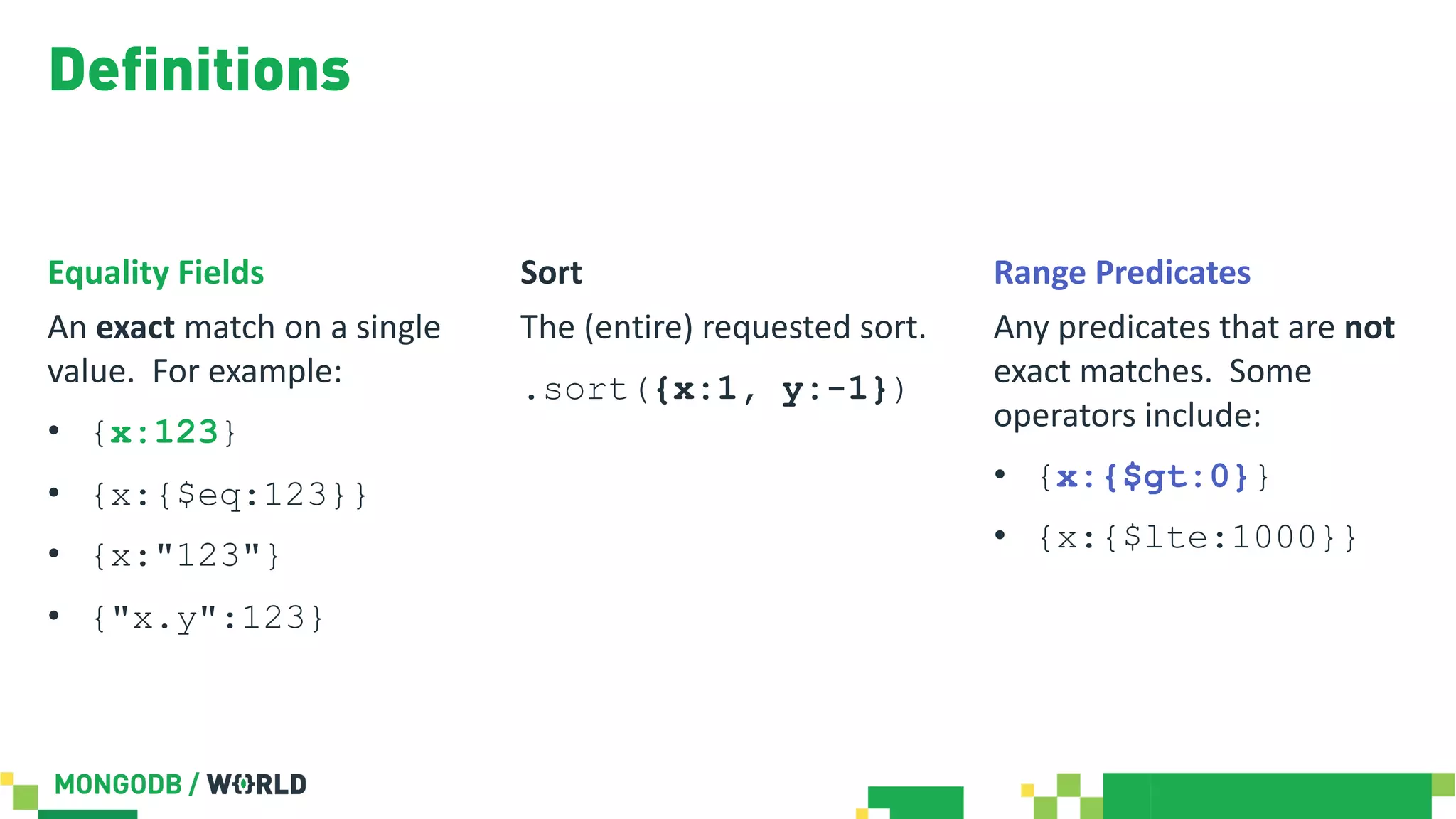
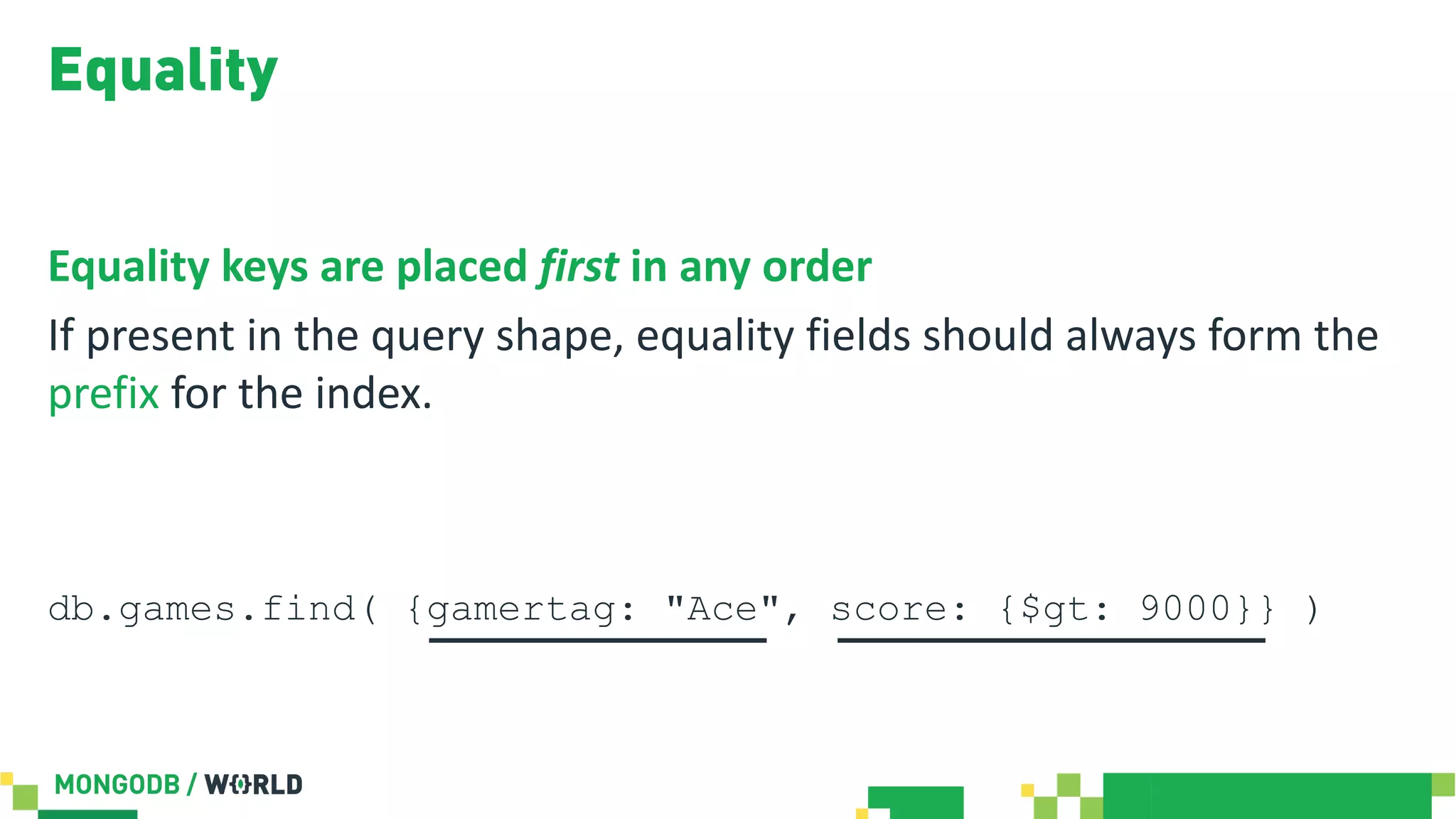


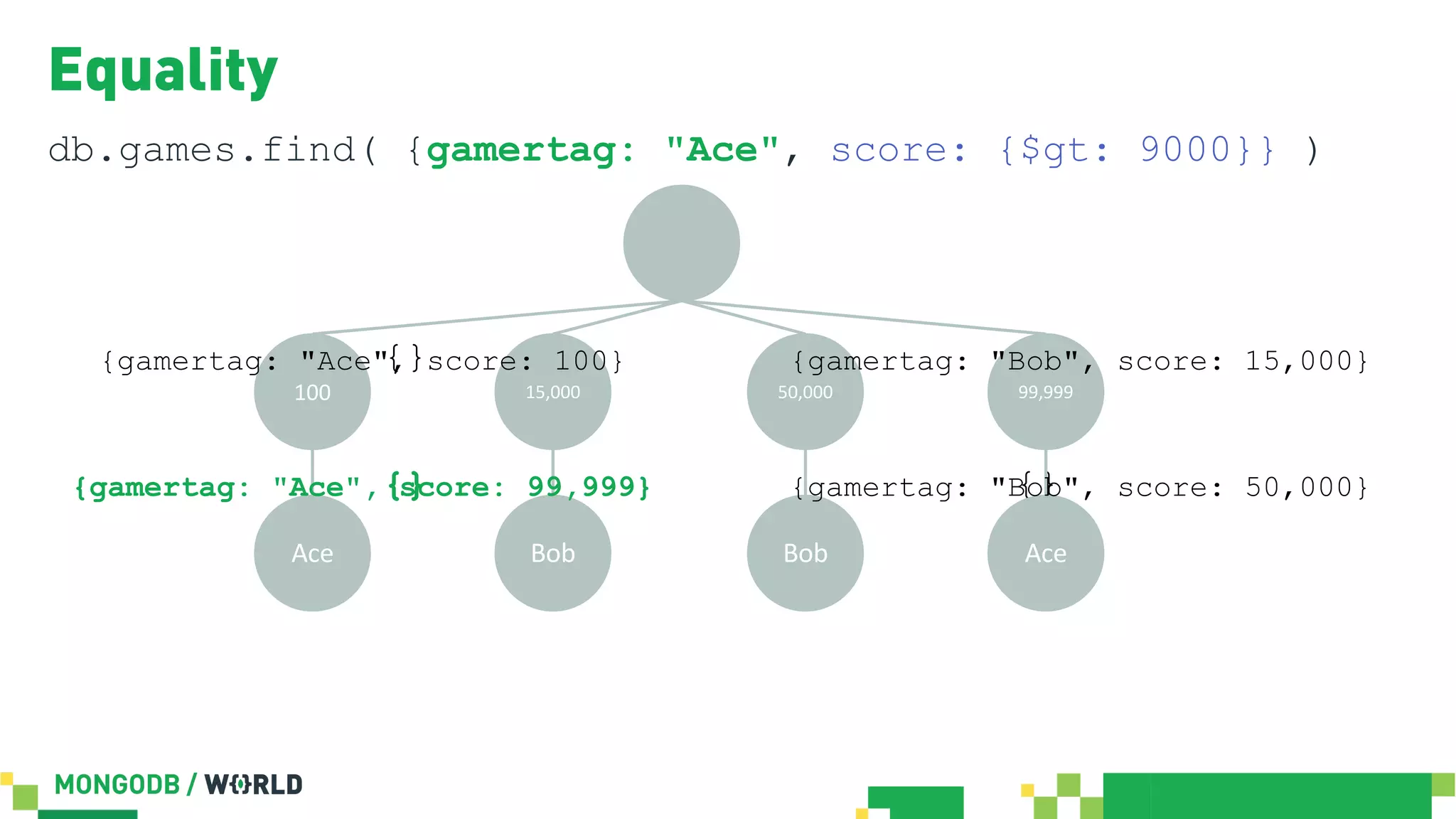


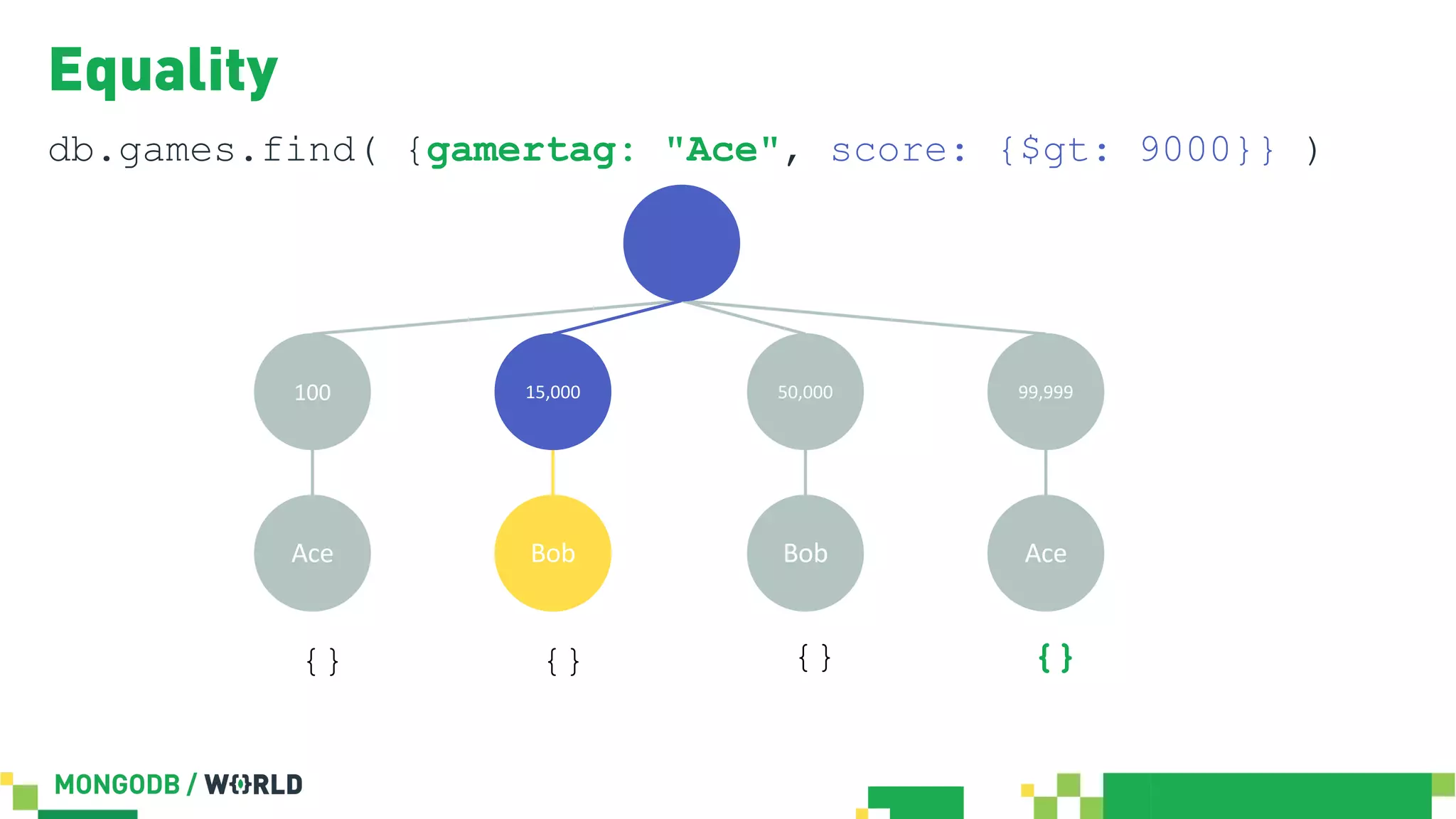



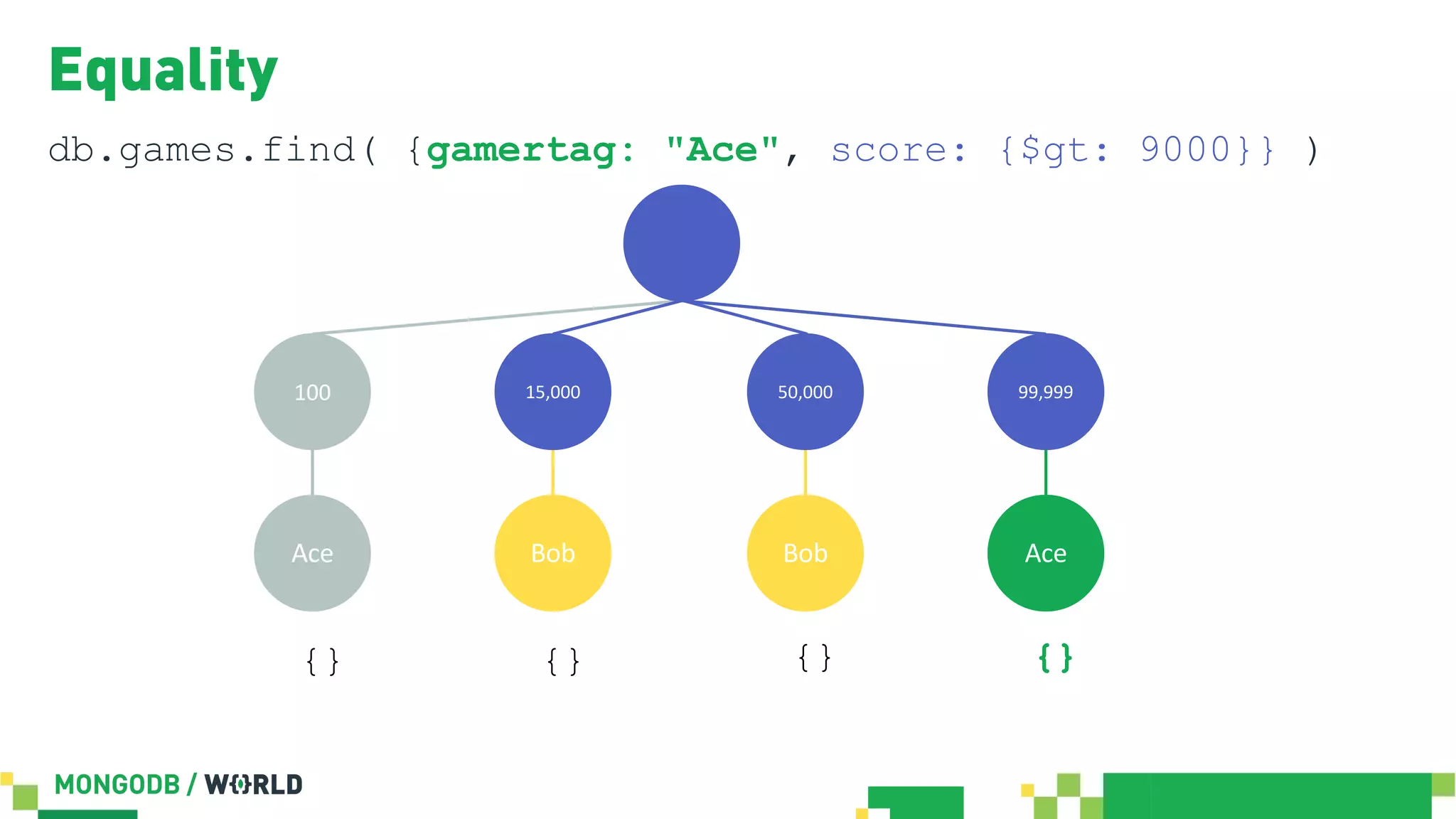



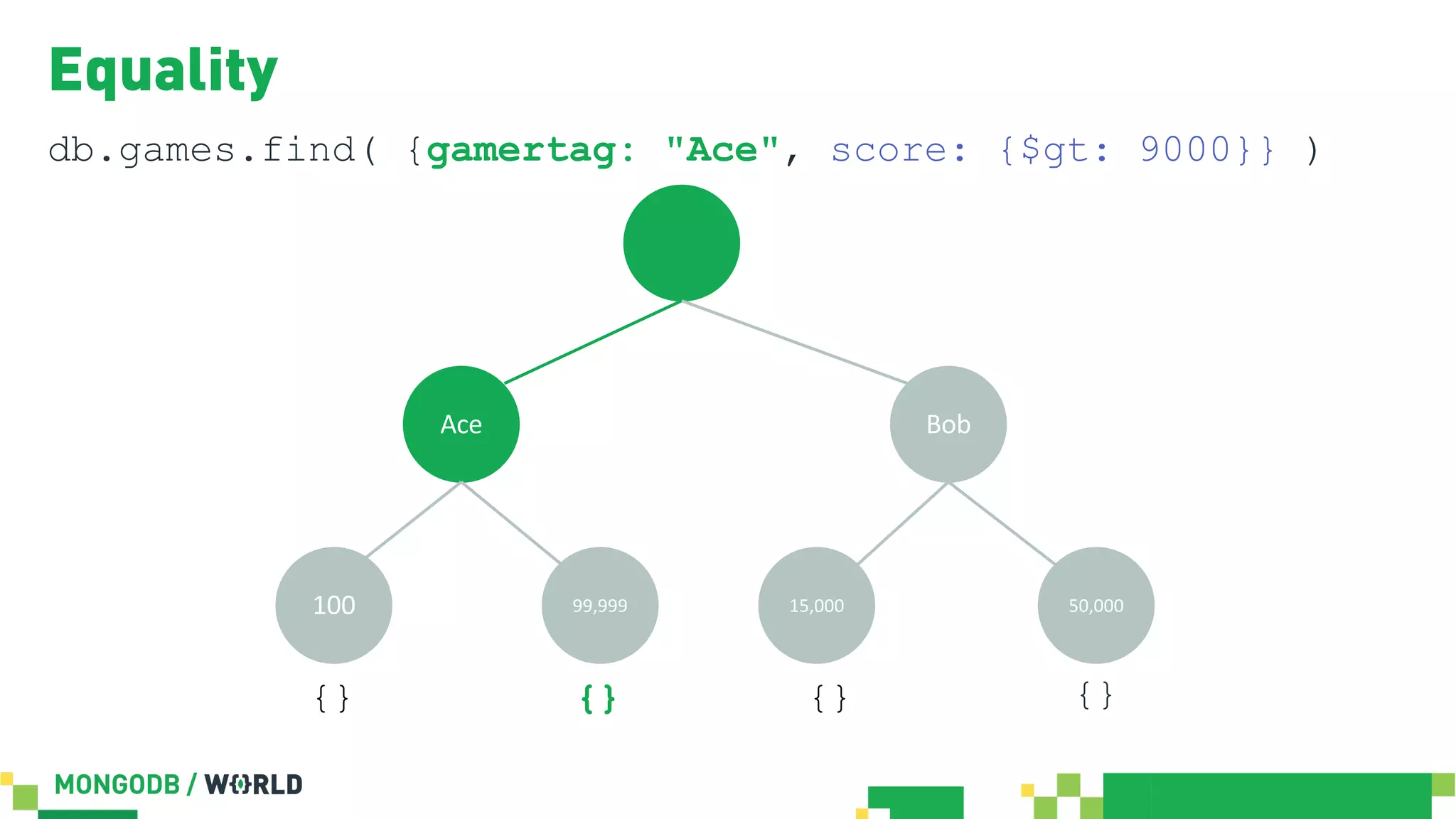





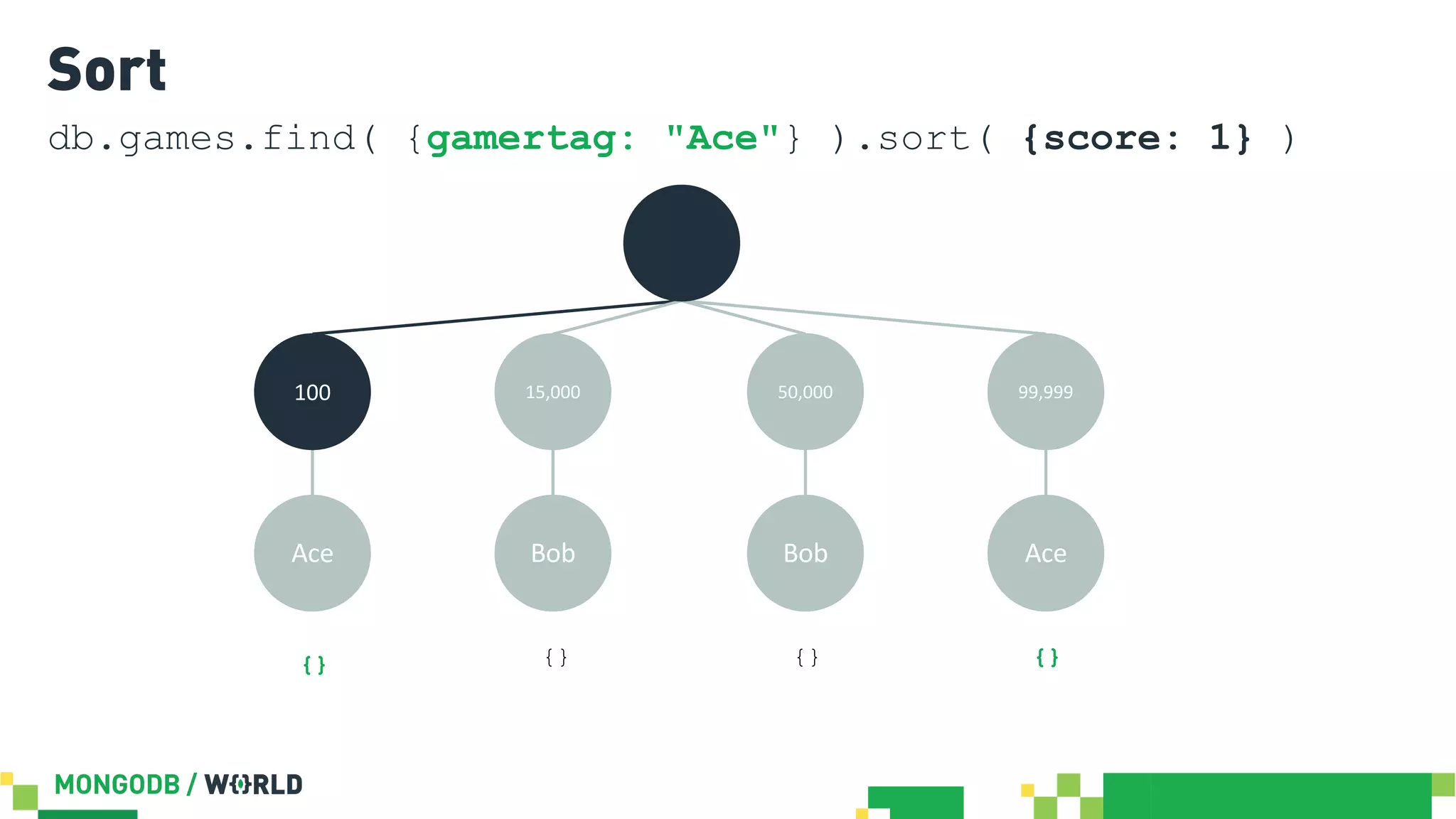

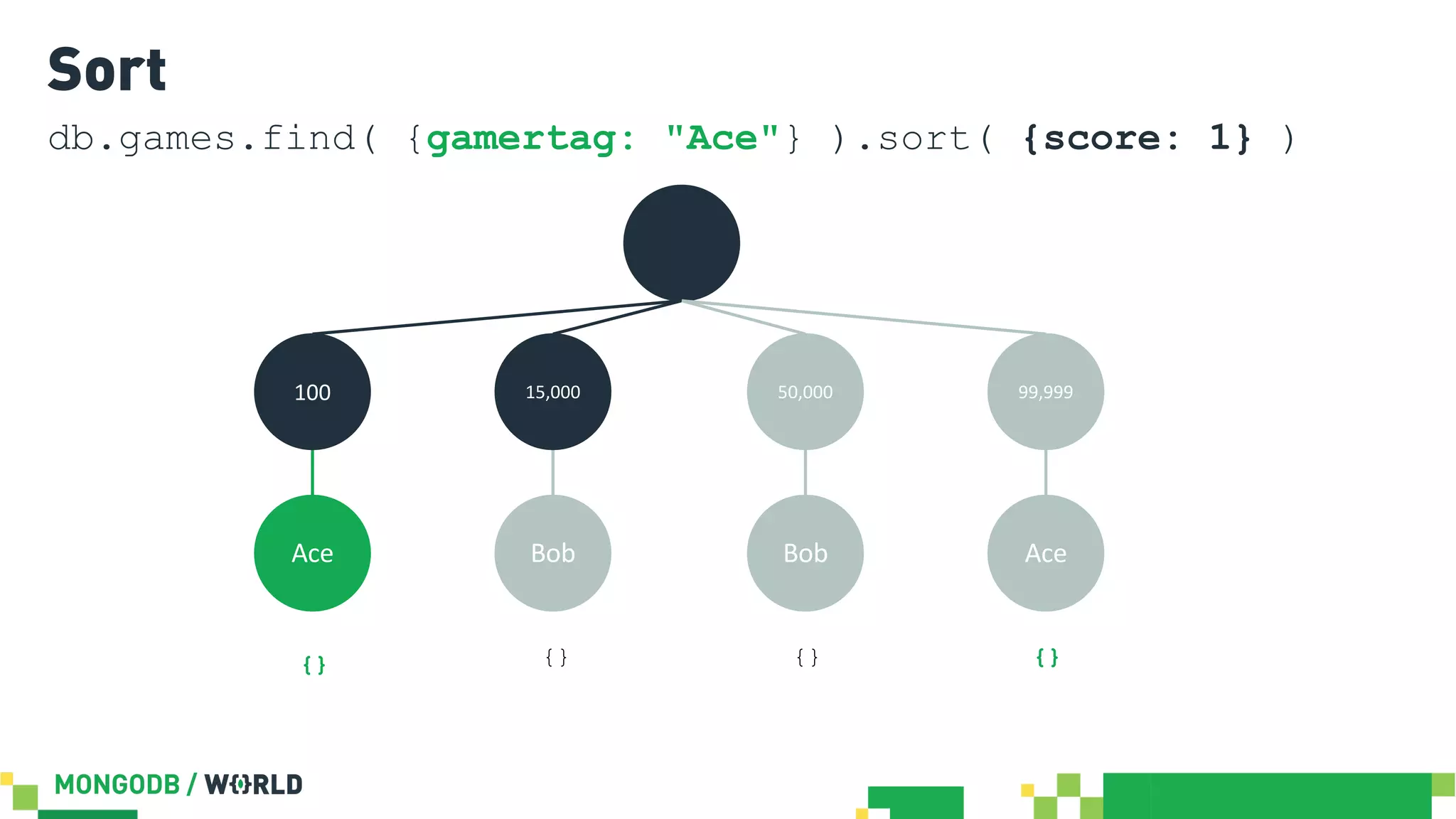
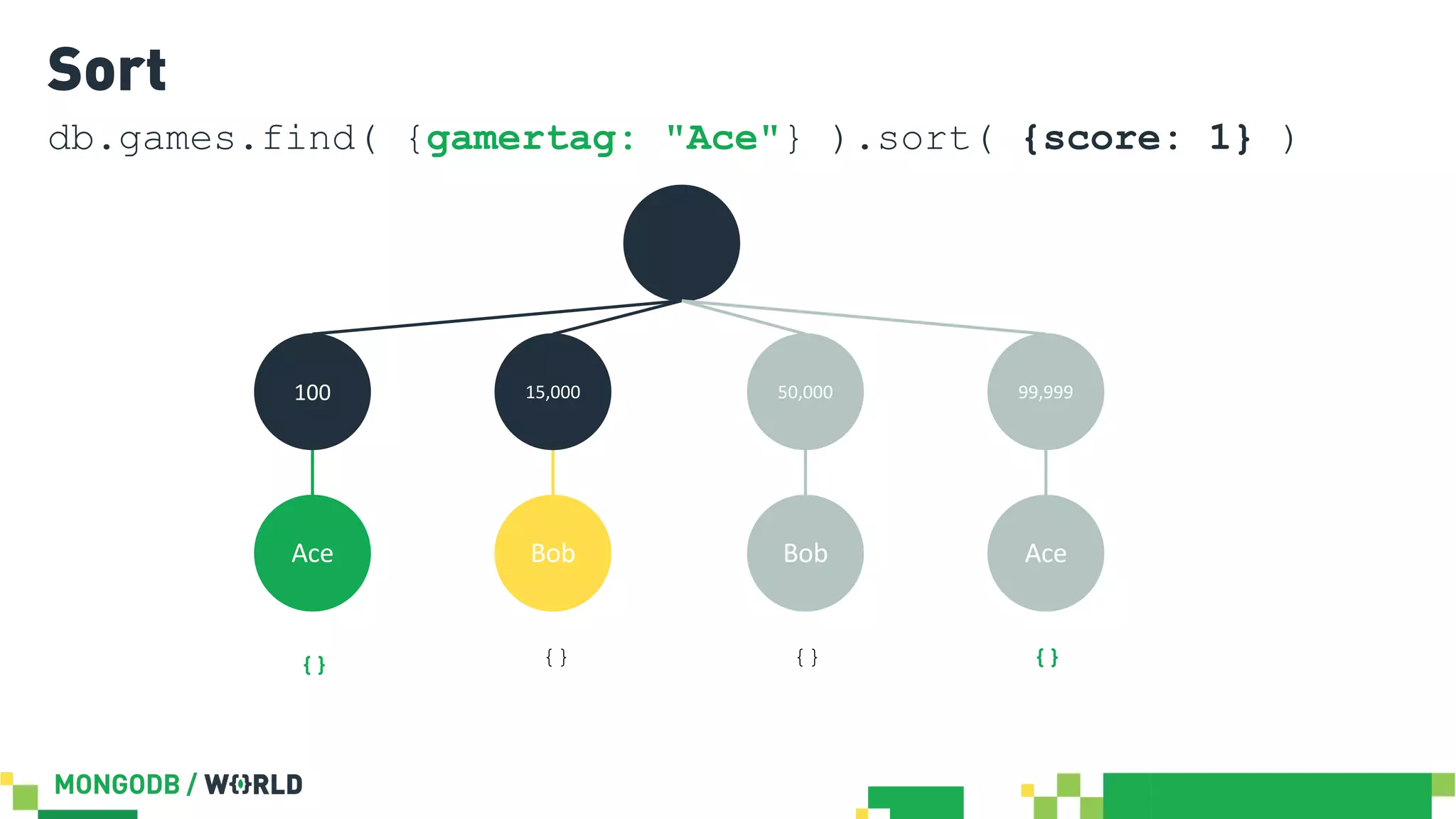
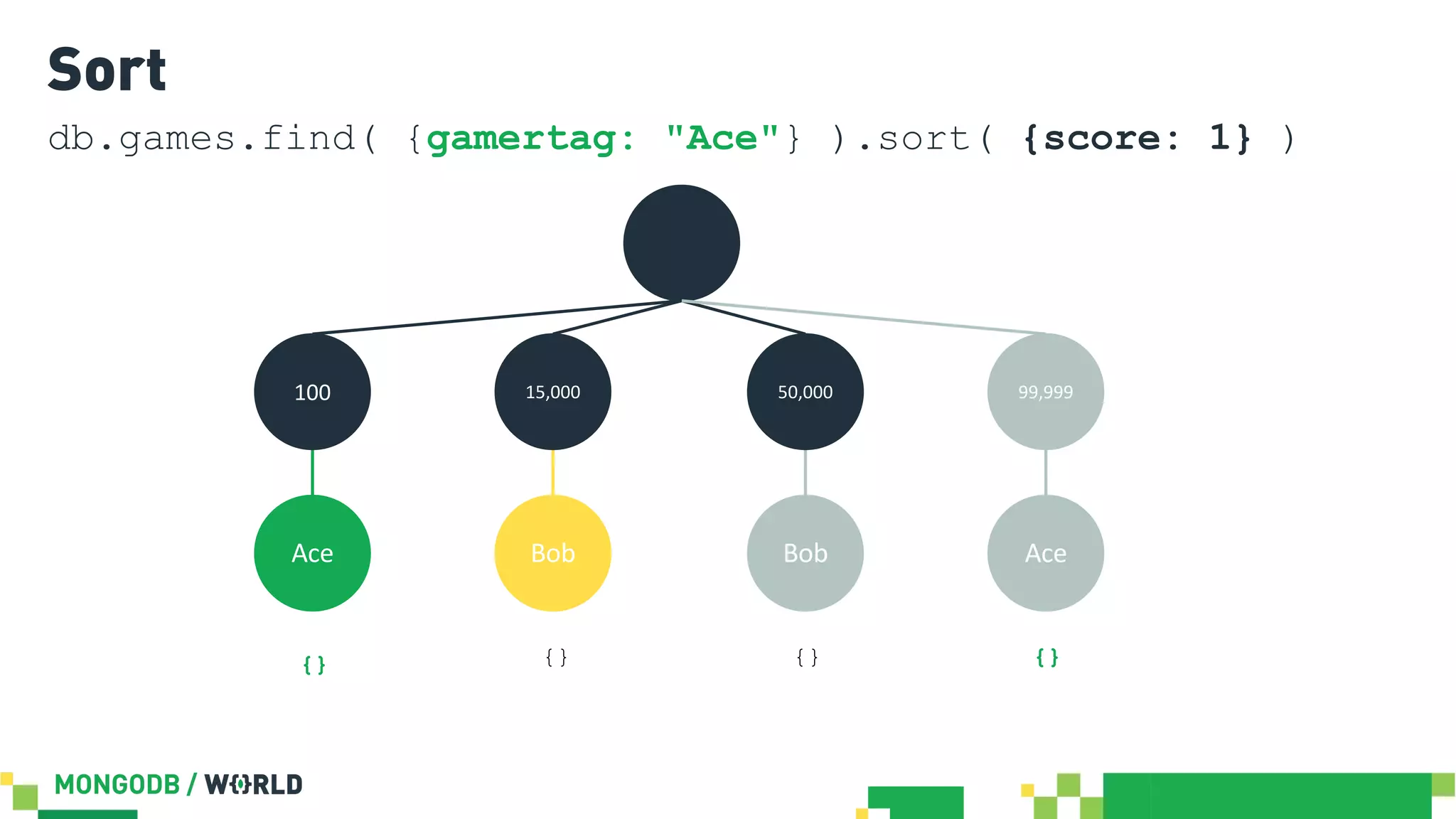
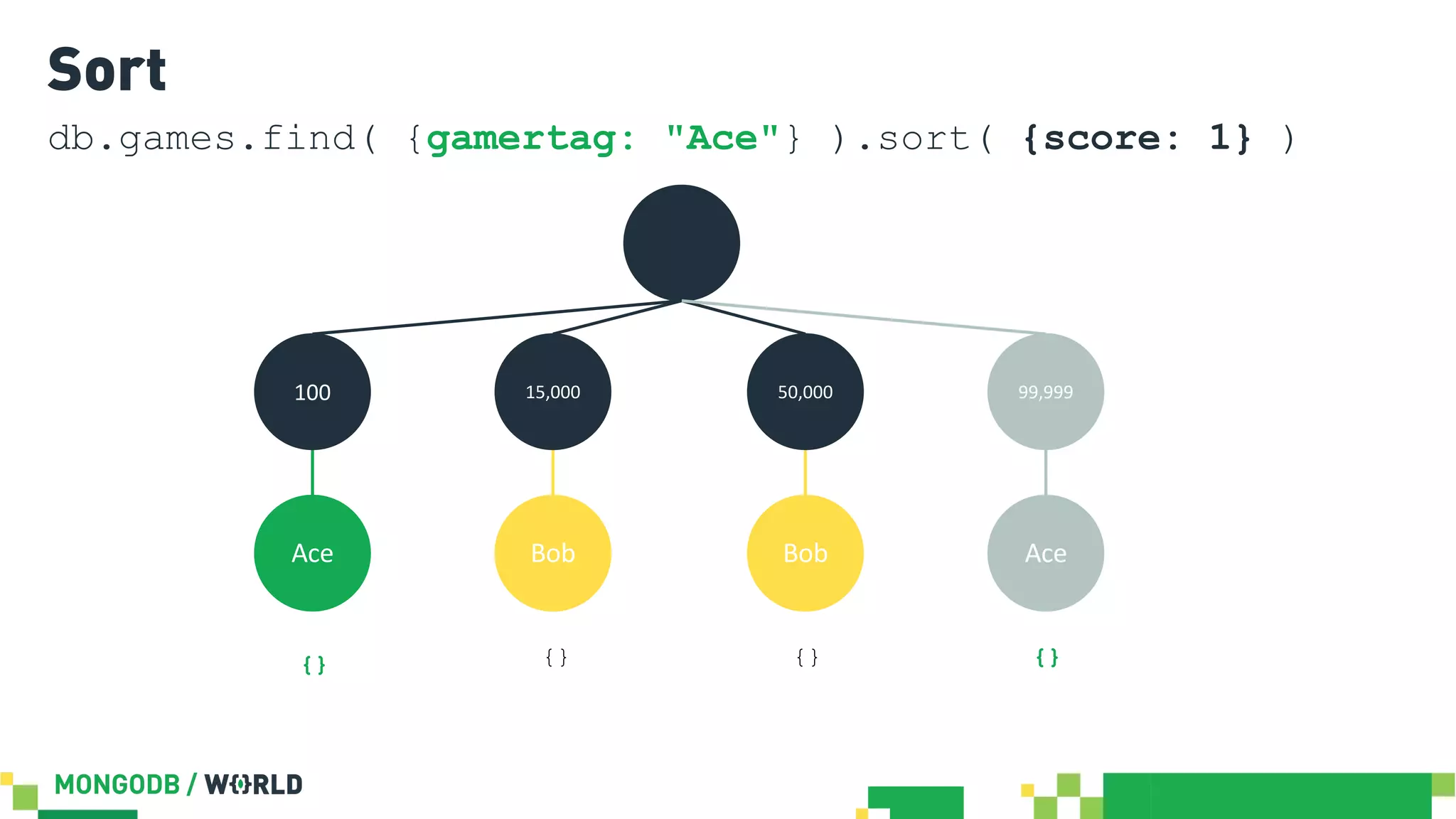
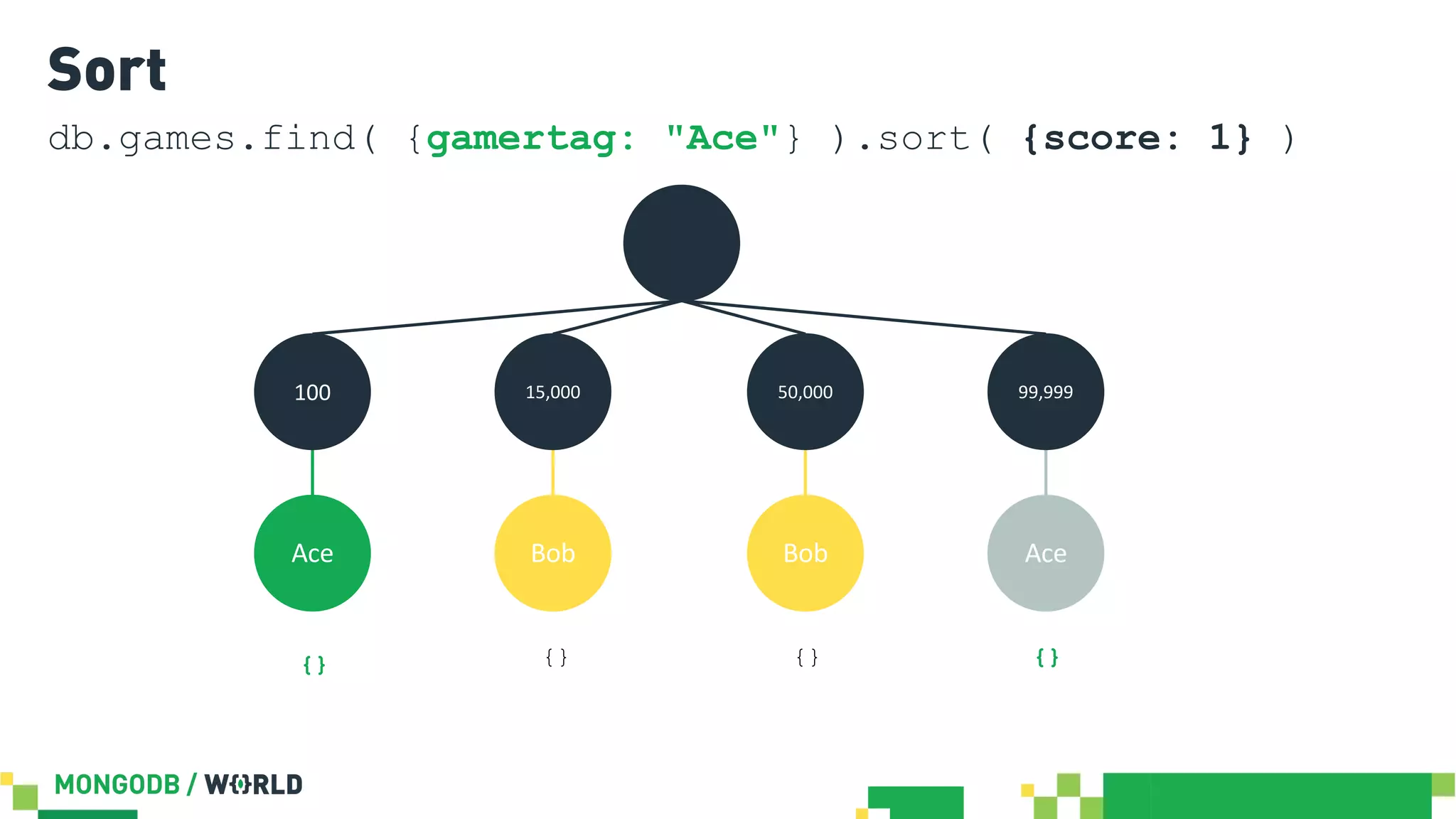


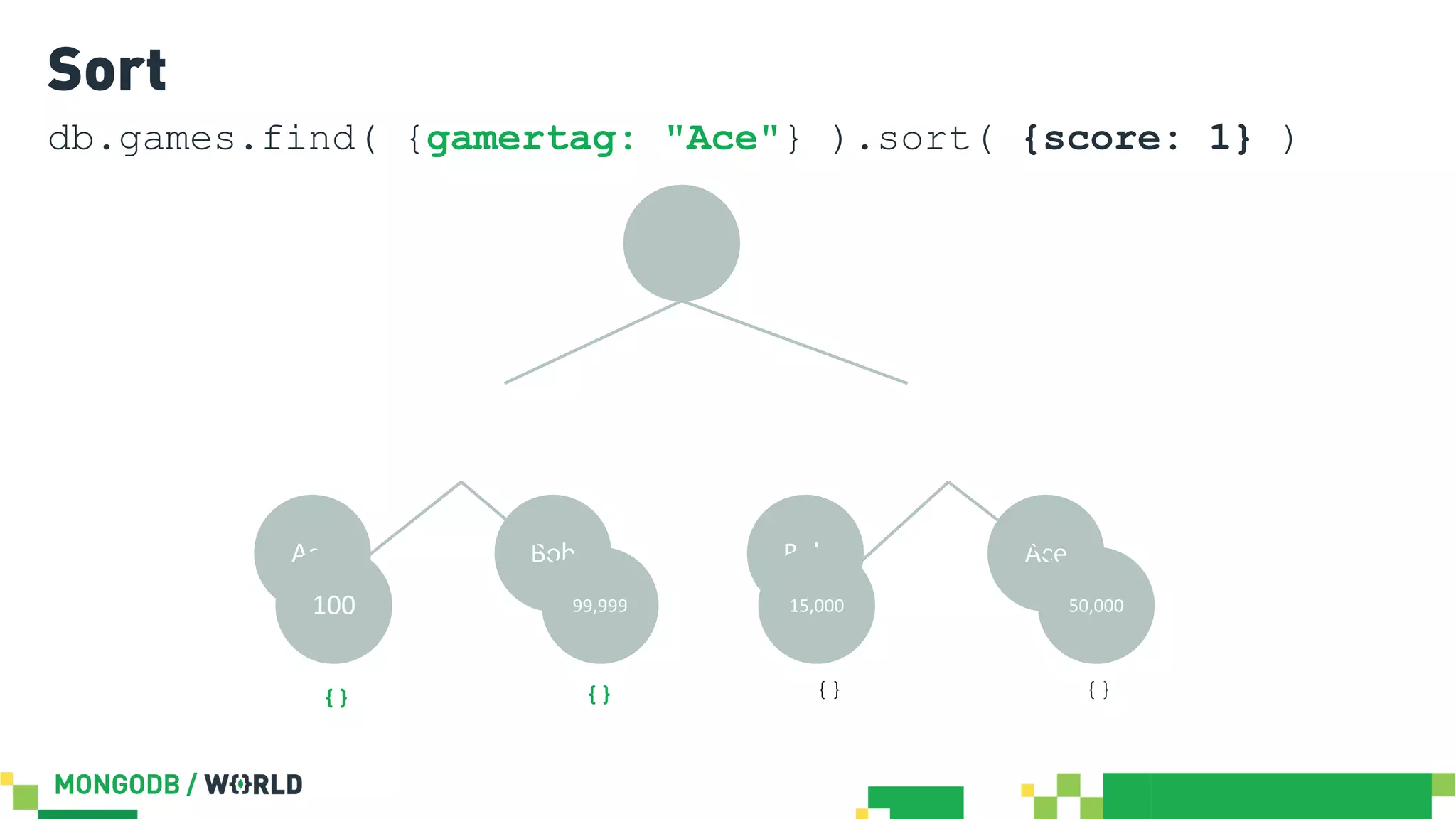





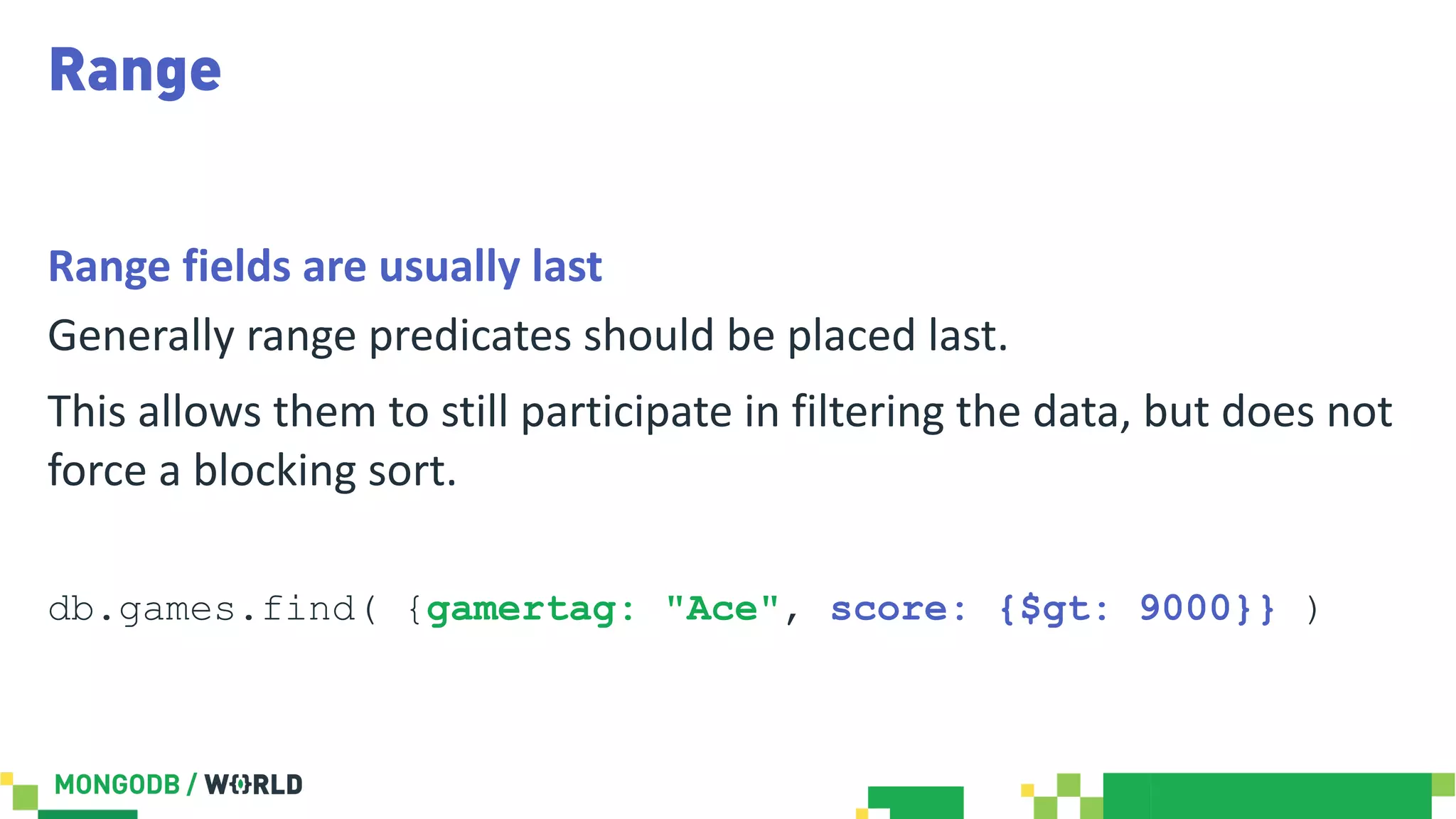









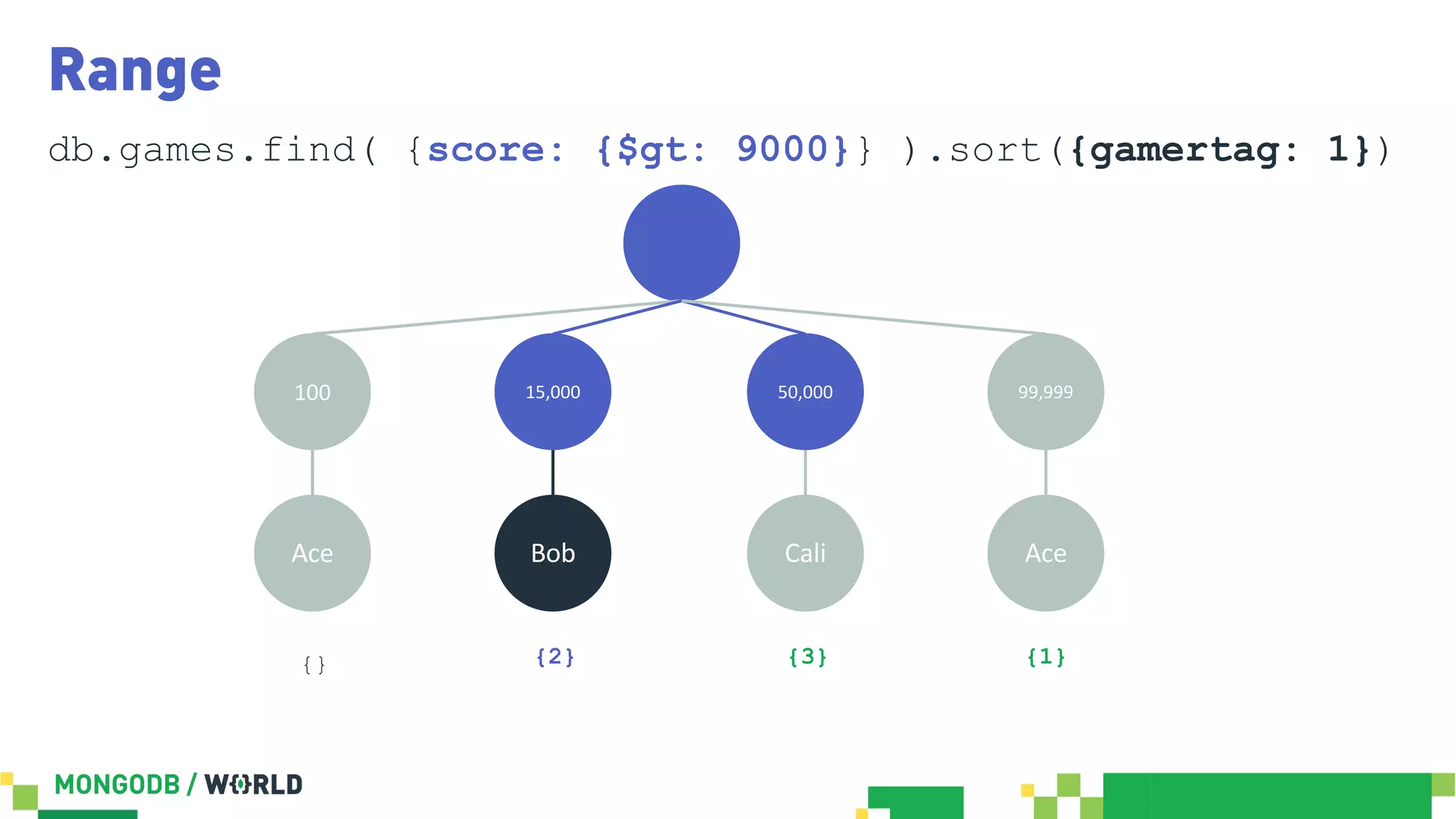



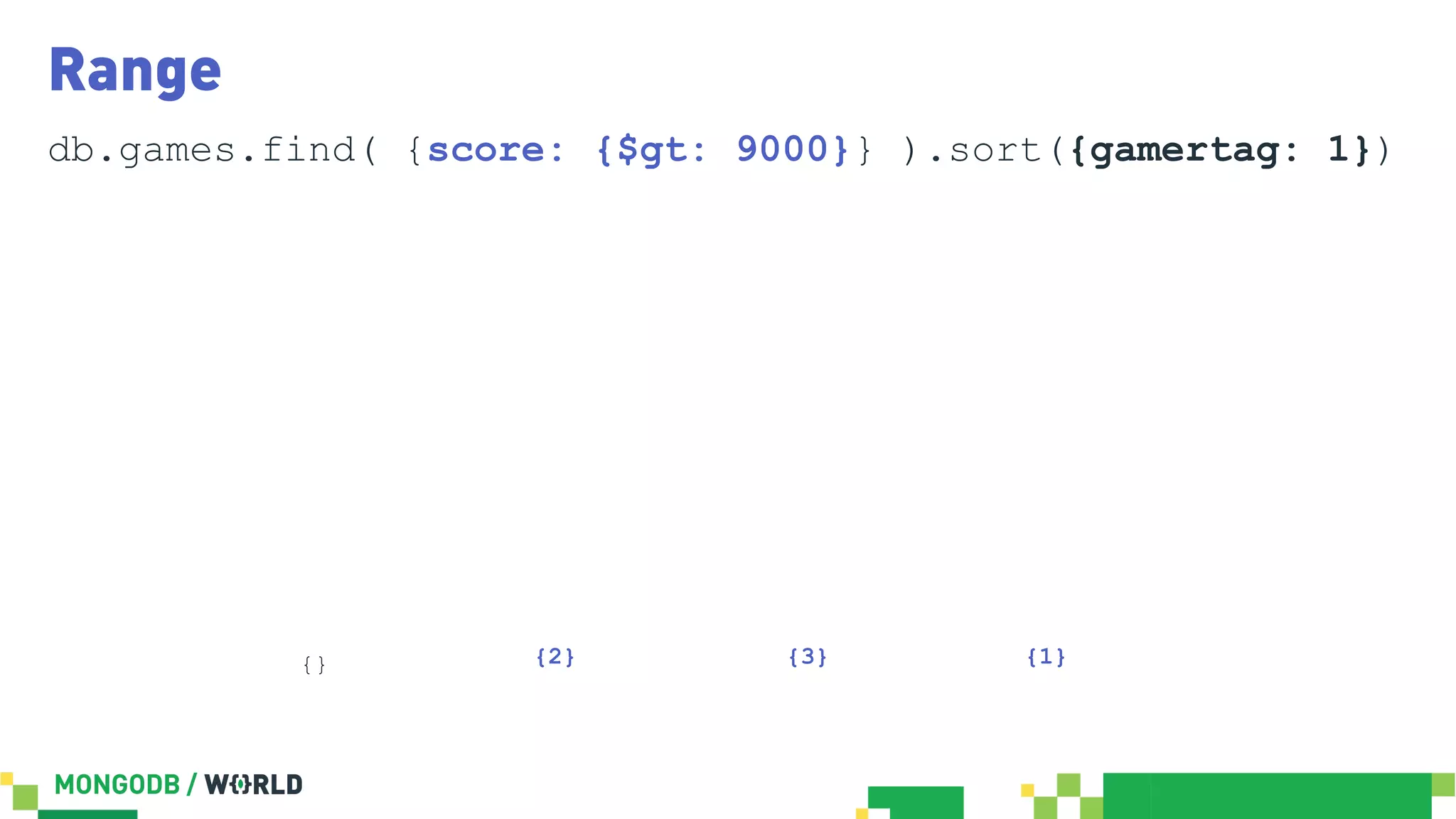
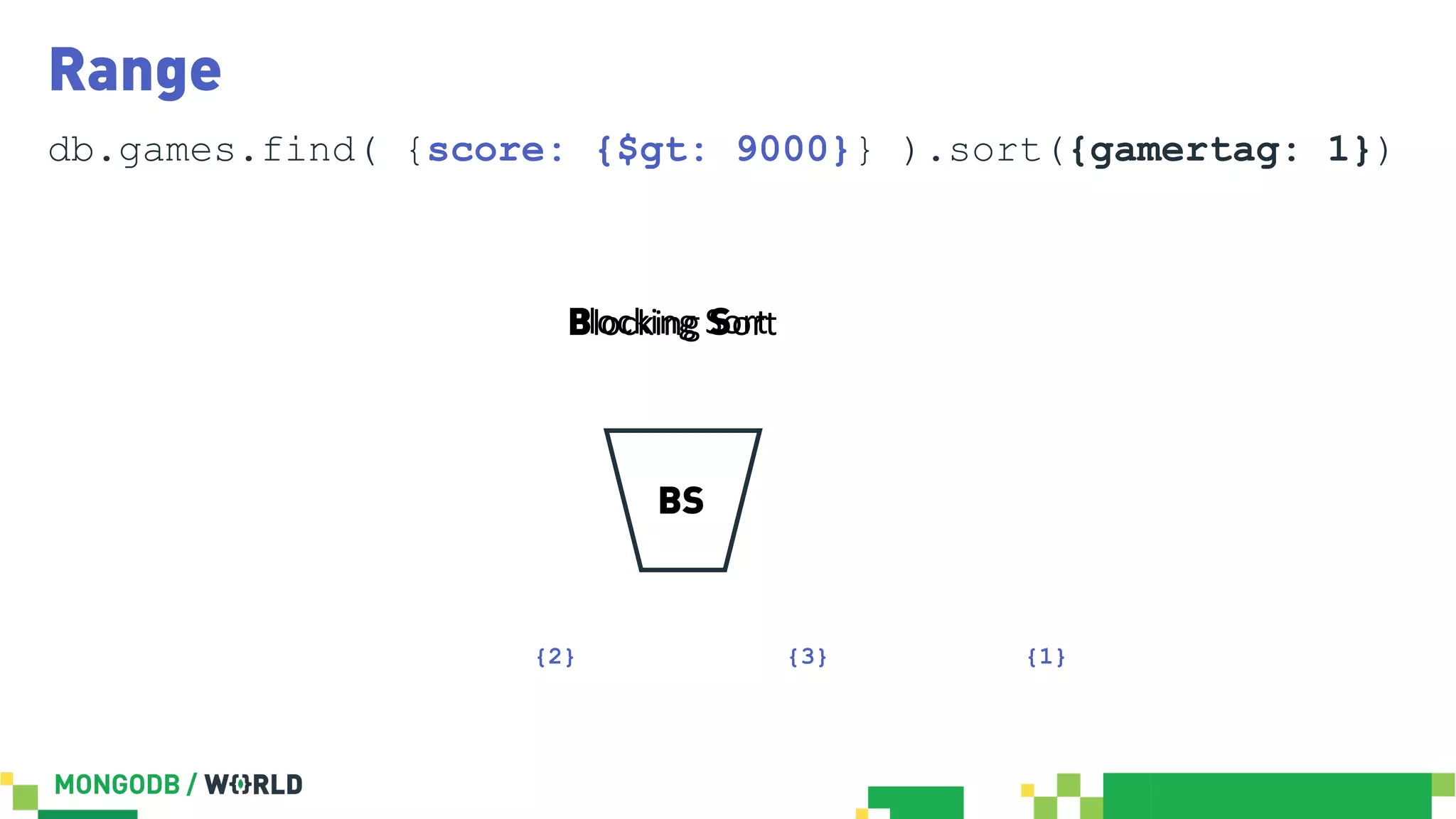













![Predicate Type Check - Inequality
Inequality operators, such as the
following, are E, S, or R?
§ $ne:123
§ $nin:[1,2]
Range!](https://image.slidesharecdn.com/chrisharristips-190701182900/75/MongoDB-World-2019-Tips-and-Tricks-for-Querying-and-Indexing-MongoDB-77-2048.jpg)
![Predicate Type Check - Inequality
Inequality operators, such as the
following, are E, S, or R?
§ $ne:123
§ $nin:[1,2]
Range!
How do you know?](https://image.slidesharecdn.com/chrisharristips-190701182900/75/MongoDB-World-2019-Tips-and-Tricks-for-Querying-and-Indexing-MongoDB-78-2048.jpg)
![Predicate Type Check - Inequality
Inequality operators, such as the
following, are E, S, or R?
§ $ne:123
§ $nin:[1,2]
Range!
"indexBounds" : {
"x" : [
"[MinKey, 123.0)",
"(123.0, MaxKey]"
]
}](https://image.slidesharecdn.com/chrisharristips-190701182900/75/MongoDB-World-2019-Tips-and-Tricks-for-Querying-and-Indexing-MongoDB-79-2048.jpg)
![Predicate Type Check - Inequality
Range!
"indexBounds" : {
"x" : [
"[MinKey, 123.0)",
"(123.0, MaxKey]"
]
}
50 123 999](https://image.slidesharecdn.com/chrisharristips-190701182900/75/MongoDB-World-2019-Tips-and-Tricks-for-Querying-and-Indexing-MongoDB-80-2048.jpg)
![Predicate Type Check - Inequality
Range!
"indexBounds" : {
"x" : [
"[MinKey, 123.0)",
"(123.0, MaxKey]"
]
}
50 123 999](https://image.slidesharecdn.com/chrisharristips-190701182900/75/MongoDB-World-2019-Tips-and-Tricks-for-Querying-and-Indexing-MongoDB-81-2048.jpg)


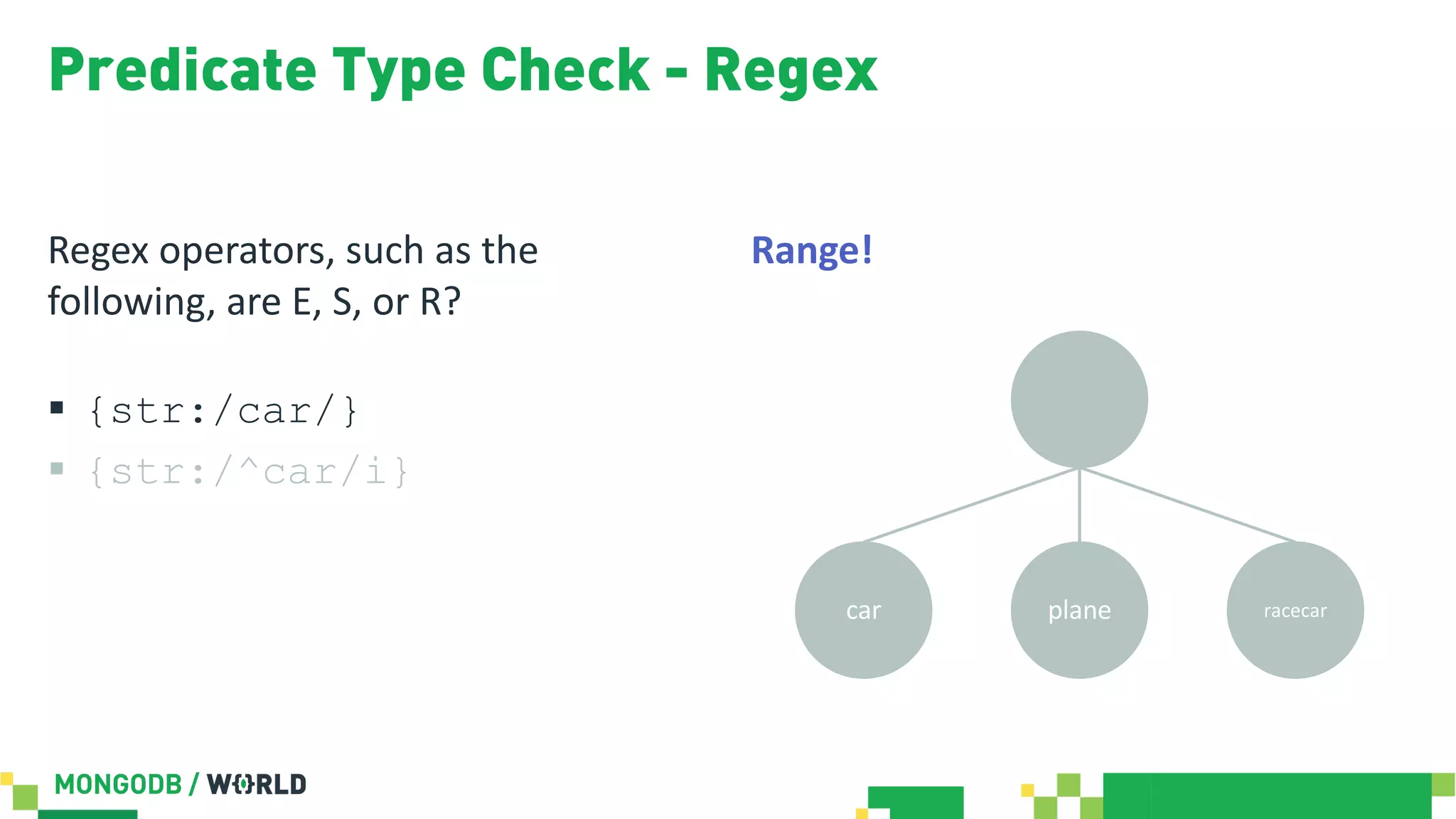


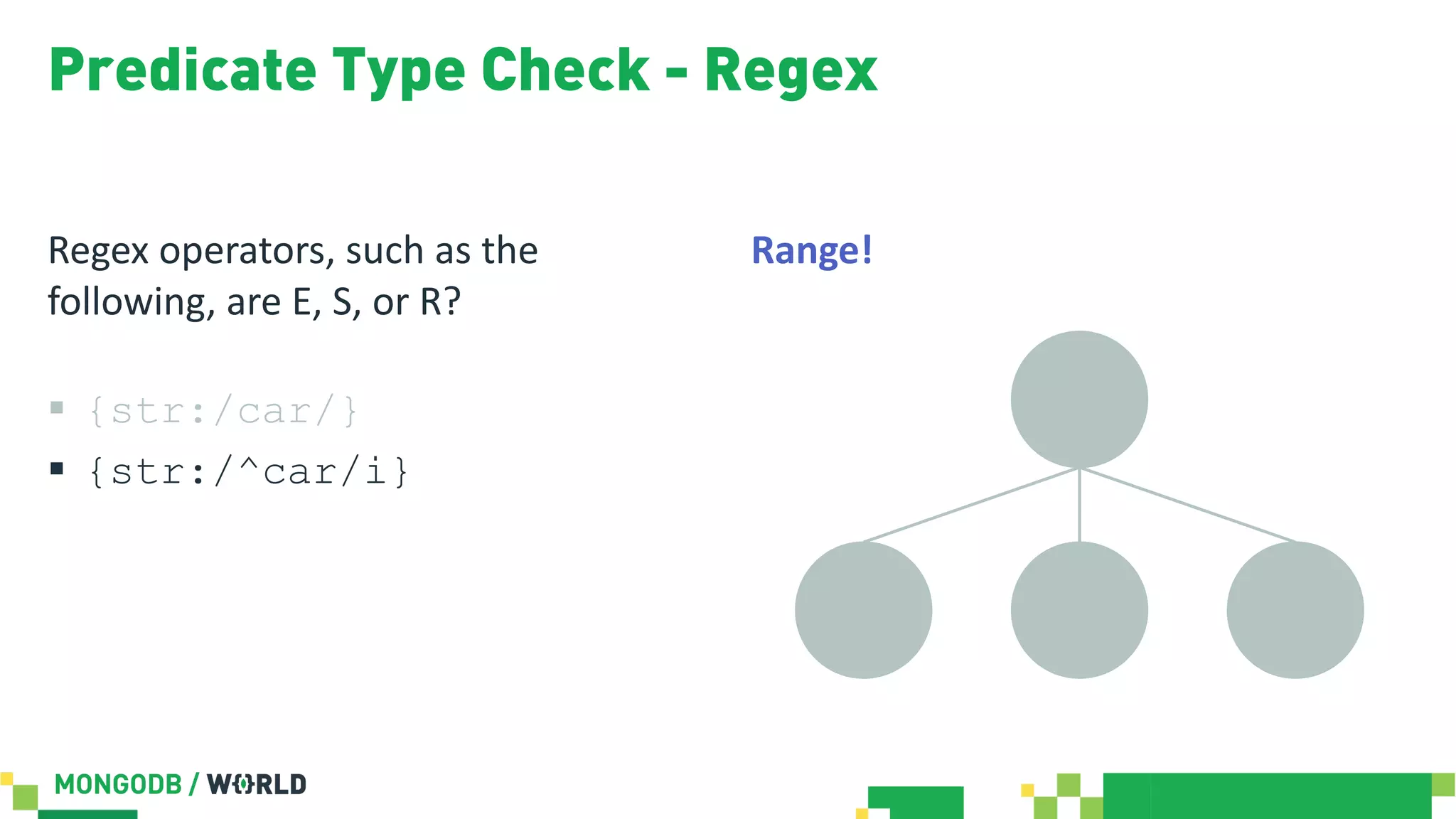

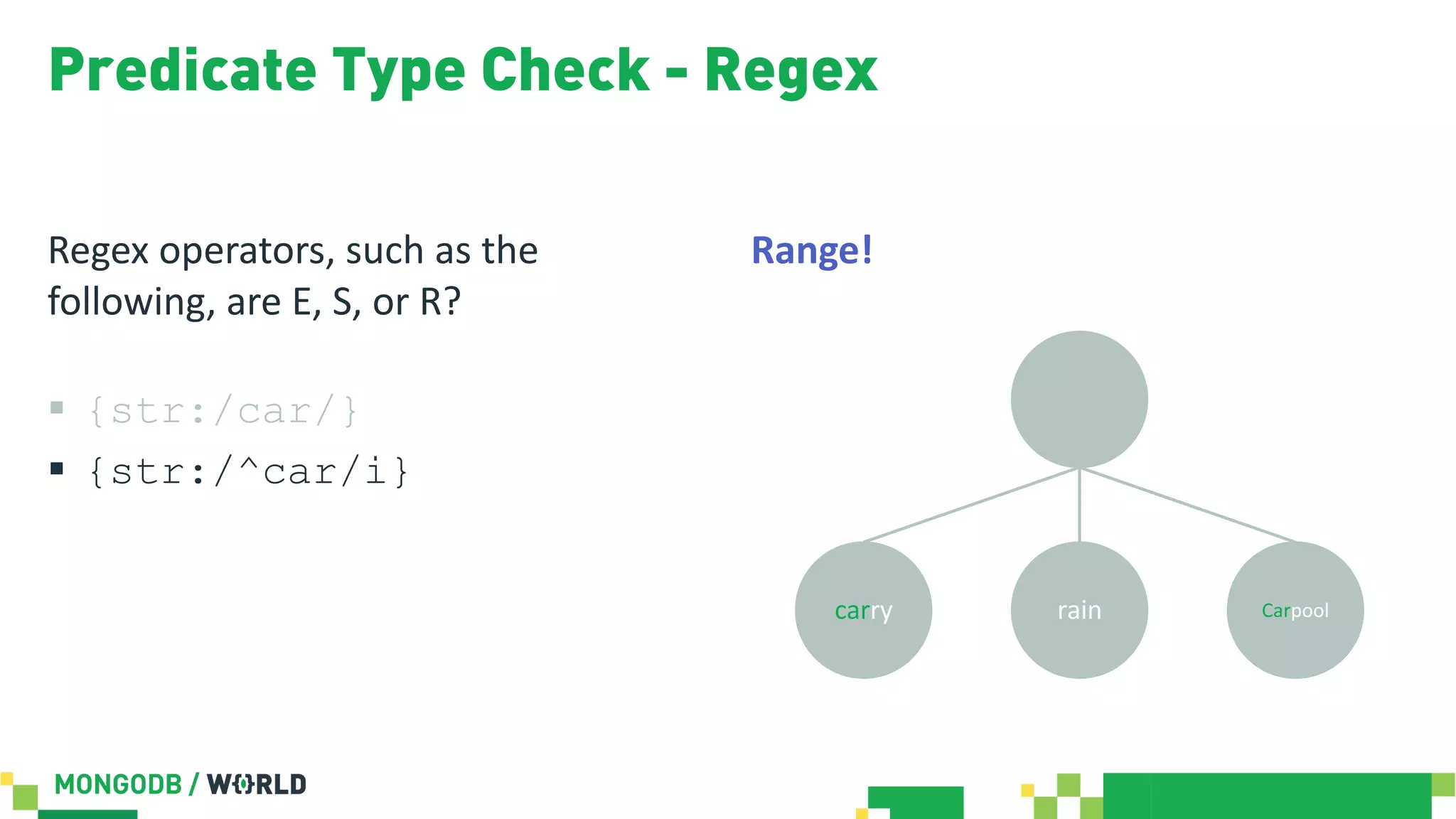

![Predicate Type Check - $in
$in filters, as demonstrated below,
are E, S, or R?
§ {field:{$in:[1,3]}}
… it depends! Can be Equality or
Range in terms of the key ordering](https://image.slidesharecdn.com/chrisharristips-190701182900/75/MongoDB-World-2019-Tips-and-Tricks-for-Querying-and-Indexing-MongoDB-91-2048.jpg)
![Predicate Type Check - $in
{field:{$in:[1,3]}}
"indexBounds" : {
"field" : [
"[1.0, 1.0]",
"[3.0, 3.0]"
],
"sortField" : [
"[MinKey, MaxKey]"
]
}
1 2 3
C G B F A D](https://image.slidesharecdn.com/chrisharristips-190701182900/75/MongoDB-World-2019-Tips-and-Tricks-for-Querying-and-Indexing-MongoDB-92-2048.jpg)
![Predicate Type Check - $in
{field:{$in:[1,3]}}
"indexBounds" : {
"field" : [
"[1.0, 1.0]",
"[3.0, 3.0]"
],
"sortField" : [
"[MinKey, MaxKey]"
]
}
1 2 3
C G B F A D](https://image.slidesharecdn.com/chrisharristips-190701182900/75/MongoDB-World-2019-Tips-and-Tricks-for-Querying-and-Indexing-MongoDB-93-2048.jpg)
![Predicate Type Check - $in
{field:{$in:[1,3]}}
"indexBounds" : {
"field" : [
"[1.0, 1.0]",
"[3.0, 3.0]"
],
"sortField" : [
"[MinKey, MaxKey]"
]
}
1 2 3
C G B F A D](https://image.slidesharecdn.com/chrisharristips-190701182900/75/MongoDB-World-2019-Tips-and-Tricks-for-Querying-and-Indexing-MongoDB-94-2048.jpg)
![Predicate Type Check - $in
{field:{$in:[1,3]}}
"indexBounds" : {
"field" : [
"[1.0, 1.0]",
"[3.0, 3.0]"
],
"sortField" : [
"[MinKey, MaxKey]"
]
}
1 2 3
C G B F A D](https://image.slidesharecdn.com/chrisharristips-190701182900/75/MongoDB-World-2019-Tips-and-Tricks-for-Querying-and-Indexing-MongoDB-95-2048.jpg)
![Predicate Type Check - $in
{field:{$in:[1,3]}}
"indexBounds" : {
"field" : [
"[1.0, 1.0]",
"[3.0, 3.0]"
],
"sortField" : [
"[MinKey, MaxKey]"
]
}
1 2 3
C G B F A D](https://image.slidesharecdn.com/chrisharristips-190701182900/75/MongoDB-World-2019-Tips-and-Tricks-for-Querying-and-Indexing-MongoDB-96-2048.jpg)
![Predicate Type Check - $in
{field:{$in:[1,3]}}
"indexBounds" : {
"field" : [
"[1.0, 1.0]",
"[3.0, 3.0]"
],
"sortField" : [
"[MinKey, MaxKey]"
]
}
1 2 3
C G B F A D
BS](https://image.slidesharecdn.com/chrisharristips-190701182900/75/MongoDB-World-2019-Tips-and-Tricks-for-Querying-and-Indexing-MongoDB-97-2048.jpg)
![Predicate Type Check - $in
{field:{$in:[1,3]}}
"indexBounds" : {
"field" : [
"[1.0, 1.0]",
"[3.0, 3.0]"
],
"sortField" : [
"[MinKey, MaxKey]"
]
}](https://image.slidesharecdn.com/chrisharristips-190701182900/75/MongoDB-World-2019-Tips-and-Tricks-for-Querying-and-Indexing-MongoDB-98-2048.jpg)
![Predicate Type Check - $in
{field:{$in:[1,3]}}](https://image.slidesharecdn.com/chrisharristips-190701182900/75/MongoDB-World-2019-Tips-and-Tricks-for-Querying-and-Indexing-MongoDB-99-2048.jpg)
![Predicate Type Check - $in
{field:{$in:[1,3]}}
"indexBounds" : {
"field" : [
"[1.0, 1.0]"
],
"sortField" : [
"[MinKey, MaxKey]"
]
}
1 2 3
C G B F A D
{} {} {} {} {} {}](https://image.slidesharecdn.com/chrisharristips-190701182900/75/MongoDB-World-2019-Tips-and-Tricks-for-Querying-and-Indexing-MongoDB-100-2048.jpg)
![Predicate Type Check - $in
1 2 3
C G B F A D
1 2 3
C G B F A D
{} {} {} {} {} {} {} {} {} {} {} {}
{field:{$in:[1,3]}}
"indexBounds" : {
"field" : [
"[1.0, 1.0]"
],
"sortField" : [
"[MinKey, MaxKey]"
]
}
"indexBounds" : {
"field" : [
"[3.0, 3.0]"
],
"sortField" : [
"[MinKey, MaxKey]"
]
}](https://image.slidesharecdn.com/chrisharristips-190701182900/75/MongoDB-World-2019-Tips-and-Tricks-for-Querying-and-Indexing-MongoDB-101-2048.jpg)
![Predicate Type Check - $in
{field:{$in:[1,3]}}
"indexBounds" : {
"field" : [
"[1.0, 1.0]"
],
"sortField" : [
"[MinKey, MaxKey]"
]
}
"indexBounds" : {
"field" : [
"[3.0, 3.0]"
],
"sortField" : [
"[MinKey, MaxKey]"
]
}
1 2 3
C G B F A D
1 2 3
C G B F A D
Sort Merge
{} {} {} {} {} {} {} {} {} {} {} {}](https://image.slidesharecdn.com/chrisharristips-190701182900/75/MongoDB-World-2019-Tips-and-Tricks-for-Querying-and-Indexing-MongoDB-102-2048.jpg)


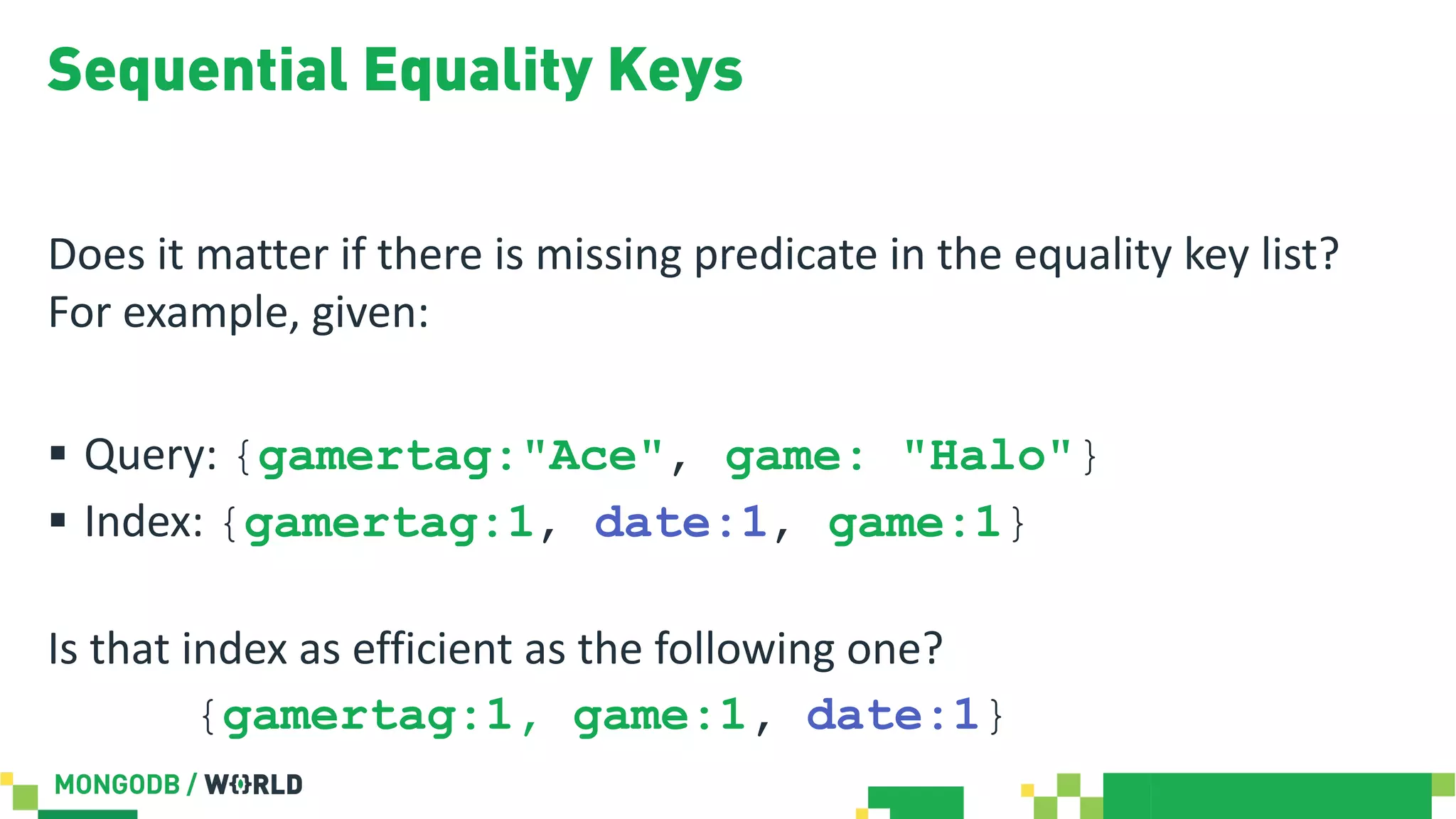
![Sequential Equality Keys
Answer: It depends! … but probably not
"indexBounds" : {
"gamertag" : [
"["Ace", "Ace"]"
],
"date" : [
"[MinKey, MaxKey]"
],
"game" : [
"["Halo", "Halo"]"
]
}](https://image.slidesharecdn.com/chrisharristips-190701182900/75/MongoDB-World-2019-Tips-and-Tricks-for-Querying-and-Indexing-MongoDB-106-2048.jpg)
![Sequential Equality Keys
Ace
Mario Halo
2016 2017
Mario Halo
2018 2019
"indexBounds" : {
"gamertag" : [
"["Ace", "Ace"]"
],
"date" : [
"[MinKey, MaxKey]"
],
"game" : [
"["Halo", "Halo"]"
]
}](https://image.slidesharecdn.com/chrisharristips-190701182900/75/MongoDB-World-2019-Tips-and-Tricks-for-Querying-and-Indexing-MongoDB-107-2048.jpg)
![Sequential Equality Keys
Ace
Mario Halo
2016 2017
Mario Halo
2018 2019
"indexBounds" : {
"gamertag" : [
"["Ace", "Ace"]"
],
"date" : [
"[MinKey, MaxKey]"
],
"game" : [
"["Halo", "Halo"]"
]
}](https://image.slidesharecdn.com/chrisharristips-190701182900/75/MongoDB-World-2019-Tips-and-Tricks-for-Querying-and-Indexing-MongoDB-108-2048.jpg)
![Sequential Equality Keys
Ace
Mario Halo
2016 2017
Mario Halo
2018 2019
"indexBounds" : {
"gamertag" : [
"["Ace", "Ace"]"
],
"date" : [
"[MinKey, MaxKey]"
],
"game" : [
"["Halo", "Halo"]"
]
}](https://image.slidesharecdn.com/chrisharristips-190701182900/75/MongoDB-World-2019-Tips-and-Tricks-for-Querying-and-Indexing-MongoDB-109-2048.jpg)
![Sequential Equality Keys
Ace
Mario Halo
2016 2017
Mario Halo
2018 2019
"indexBounds" : {
"gamertag" : [
"["Ace", "Ace"]"
],
"date" : [
"[MinKey, MaxKey]"
],
"game" : [
"["Halo", "Halo"]"
]
}](https://image.slidesharecdn.com/chrisharristips-190701182900/75/MongoDB-World-2019-Tips-and-Tricks-for-Querying-and-Indexing-MongoDB-110-2048.jpg)
![Sequential Equality Keys
Ace
Mario Halo
2016 2017
Mario Halo
2018 2019
"indexBounds" : {
"gamertag" : [
"["Ace", "Ace"]"
],
"date" : [
"[MinKey, MaxKey]"
],
"game" : [
"["Halo", "Halo"]"
]
}](https://image.slidesharecdn.com/chrisharristips-190701182900/75/MongoDB-World-2019-Tips-and-Tricks-for-Querying-and-Indexing-MongoDB-111-2048.jpg)
![Sequential Equality Keys
Ace
Mario Halo
2016 2017
Mario Halo
2018 2019
"indexBounds" : {
"gamertag" : [
"["Ace", "Ace"]"
],
"date" : [
"[MinKey, MaxKey]"
],
"game" : [
"["Halo", "Halo"]"
]
}](https://image.slidesharecdn.com/chrisharristips-190701182900/75/MongoDB-World-2019-Tips-and-Tricks-for-Querying-and-Indexing-MongoDB-112-2048.jpg)
![Sequential Equality Keys
Ace
Mario Halo
2016 2017
Mario Halo
2018 2019
"indexBounds" : {
"gamertag" : [
"["Ace", "Ace"]"
],
"date" : [
"[MinKey, MaxKey]"
],
"game" : [
"["Halo", "Halo"]"
]
}](https://image.slidesharecdn.com/chrisharristips-190701182900/75/MongoDB-World-2019-Tips-and-Tricks-for-Querying-and-Indexing-MongoDB-113-2048.jpg)
![Sequential Equality Keys
Ace
Mario Halo
2016 2017
Mario Halo
2018 2019
"indexBounds" : {
"gamertag" : [
"["Ace", "Ace"]"
],
"date" : [
"[MinKey, MaxKey]"
],
"game" : [
"["Halo", "Halo"]"
]
}](https://image.slidesharecdn.com/chrisharristips-190701182900/75/MongoDB-World-2019-Tips-and-Tricks-for-Querying-and-Indexing-MongoDB-114-2048.jpg)
![Sequential Equality Keys
Ace
Mario Halo
2016 2017
Mario Halo
2018 2019
"indexBounds" : {
"gamertag" : [
"["Ace", "Ace"]"
],
"date" : [
"[MinKey, MaxKey]"
],
"game" : [
"["Halo", "Halo"]"
]
}](https://image.slidesharecdn.com/chrisharristips-190701182900/75/MongoDB-World-2019-Tips-and-Tricks-for-Querying-and-Indexing-MongoDB-115-2048.jpg)
!["indexBounds" : {
"gamertag" : [
"["Ace", "Ace"]"
],
"game" : [
"["Halo", "Halo"]"
]
}
Sequential Equality Keys
Ace
Mario Halo
2016 2017
Mario Halo
2018 2019
"indexBounds" : {
"gamertag" : [
"["Ace", "Ace"]"
],
"date" : [
"[MinKey, MaxKey]"
],
"game" : [
"["Halo", "Halo"]"
]
}](https://image.slidesharecdn.com/chrisharristips-190701182900/75/MongoDB-World-2019-Tips-and-Tricks-for-Querying-and-Indexing-MongoDB-116-2048.jpg)
![Halo
Sequential Equality Keys
Ace
Mario Halo
2016 2017
Mario
2018 2019
"indexBounds" : {
"gamertag" : [
"["Ace", "Ace"]"
],
"date" : [
"[MinKey, MaxKey]"
],
"game" : [
"["Halo", "Halo"]"
]
}
"indexBounds" : {
"gamertag" : [
"["Ace", "Ace"]"
],
"game" : [
"["Halo", "Halo"]"
]
}](https://image.slidesharecdn.com/chrisharristips-190701182900/75/MongoDB-World-2019-Tips-and-Tricks-for-Querying-and-Indexing-MongoDB-117-2048.jpg)
!["indexBounds" : {
"gamertag" : [
"["Ace", "Ace"]"
],
"game" : [
"["Halo", "Halo"]"
]
}
"indexBounds" : {
"gamertag" : [
"["Ace", "Ace"]"
],
"game" : [
"["Halo", "Halo"]"
]
}
"indexBounds" : {
"gamertag" : [
"["Ace", "Ace"]"
],
"game" : [
"["Halo", "Halo"]"
],
"date" : [
"[MinKey, MaxKey]"
]
}
Sequential Equality Keys
Ace
2016 2017Mario2018 2019Halo](https://image.slidesharecdn.com/chrisharristips-190701182900/75/MongoDB-World-2019-Tips-and-Tricks-for-Querying-and-Indexing-MongoDB-118-2048.jpg)







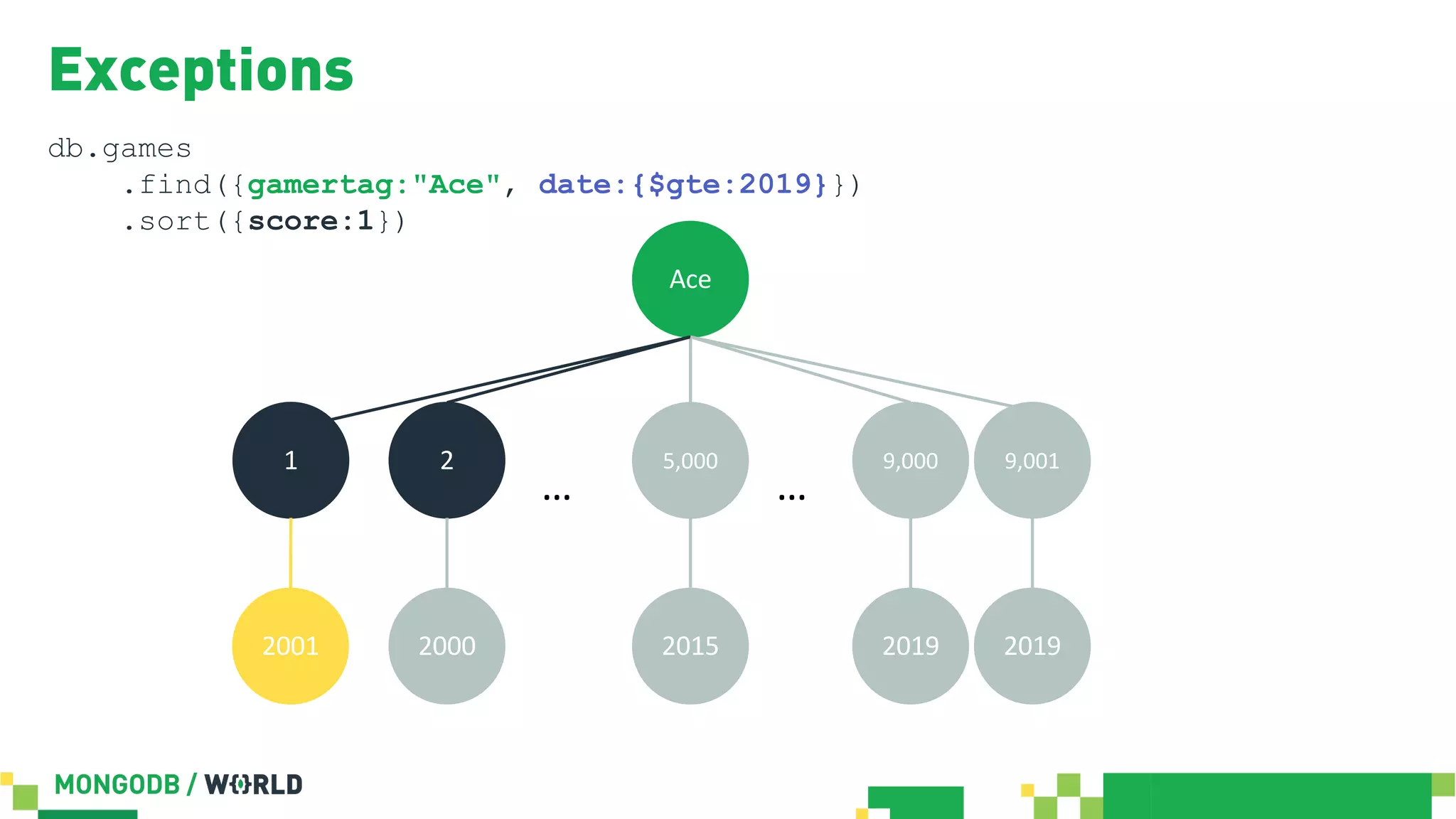


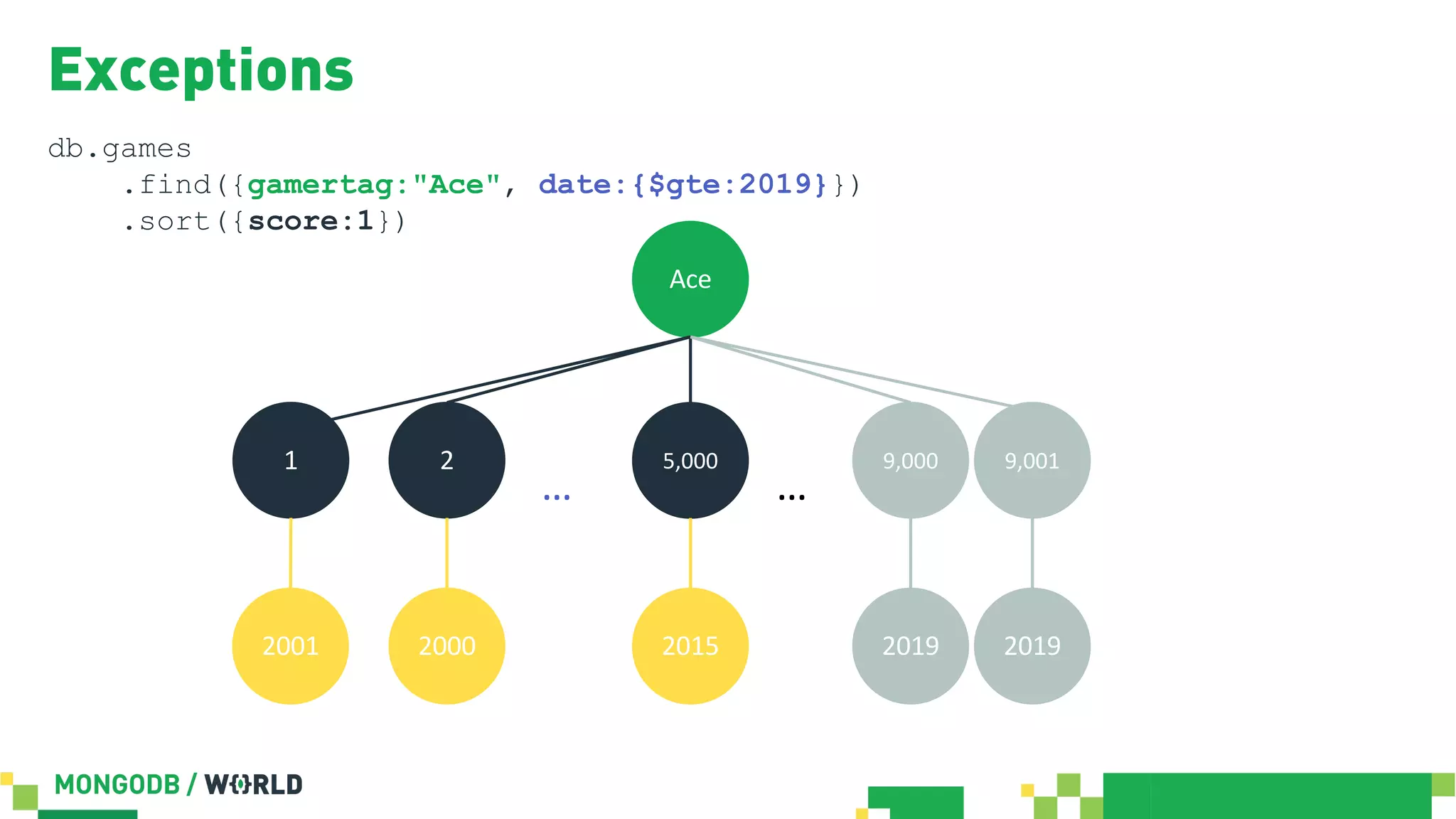




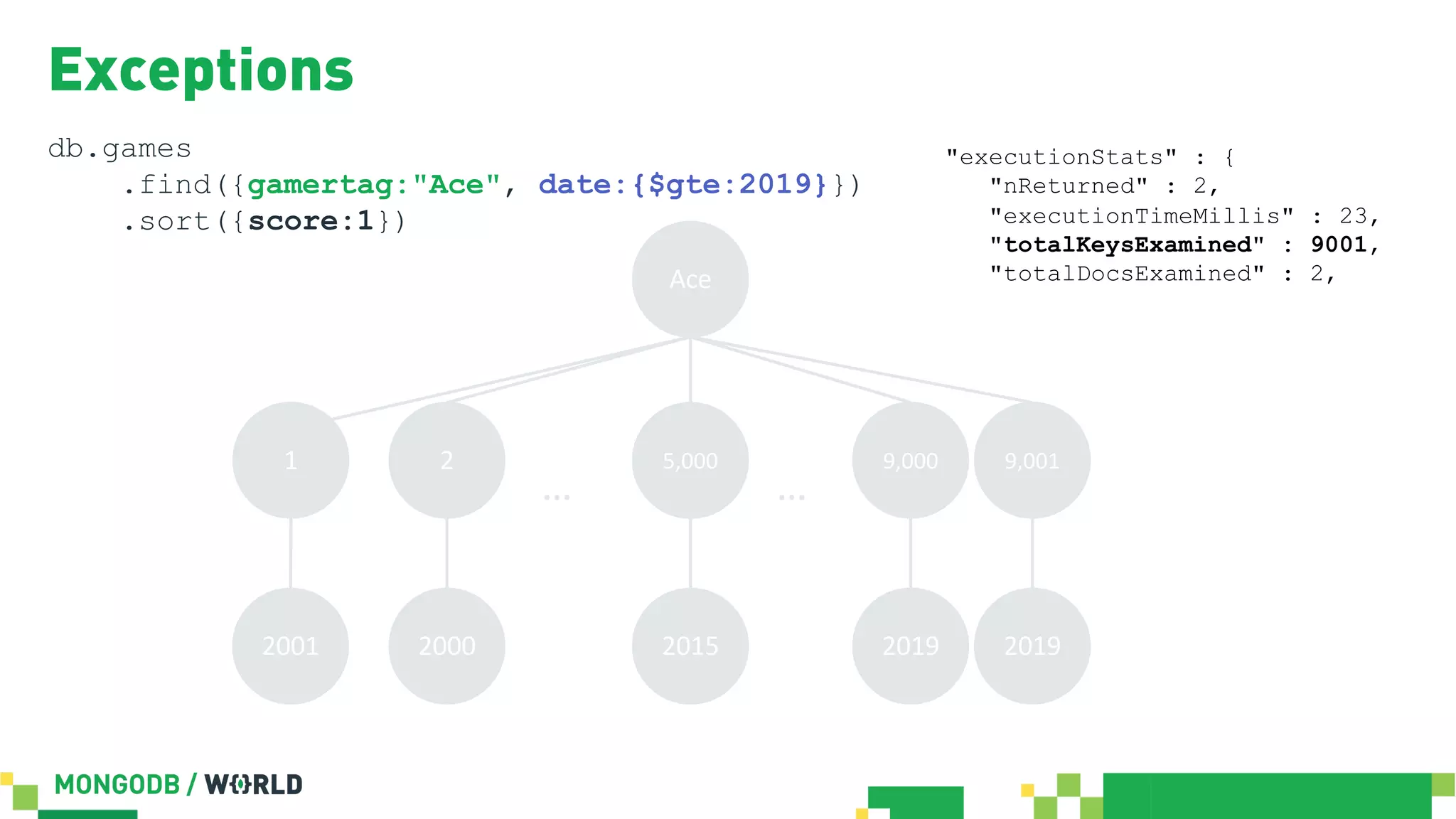



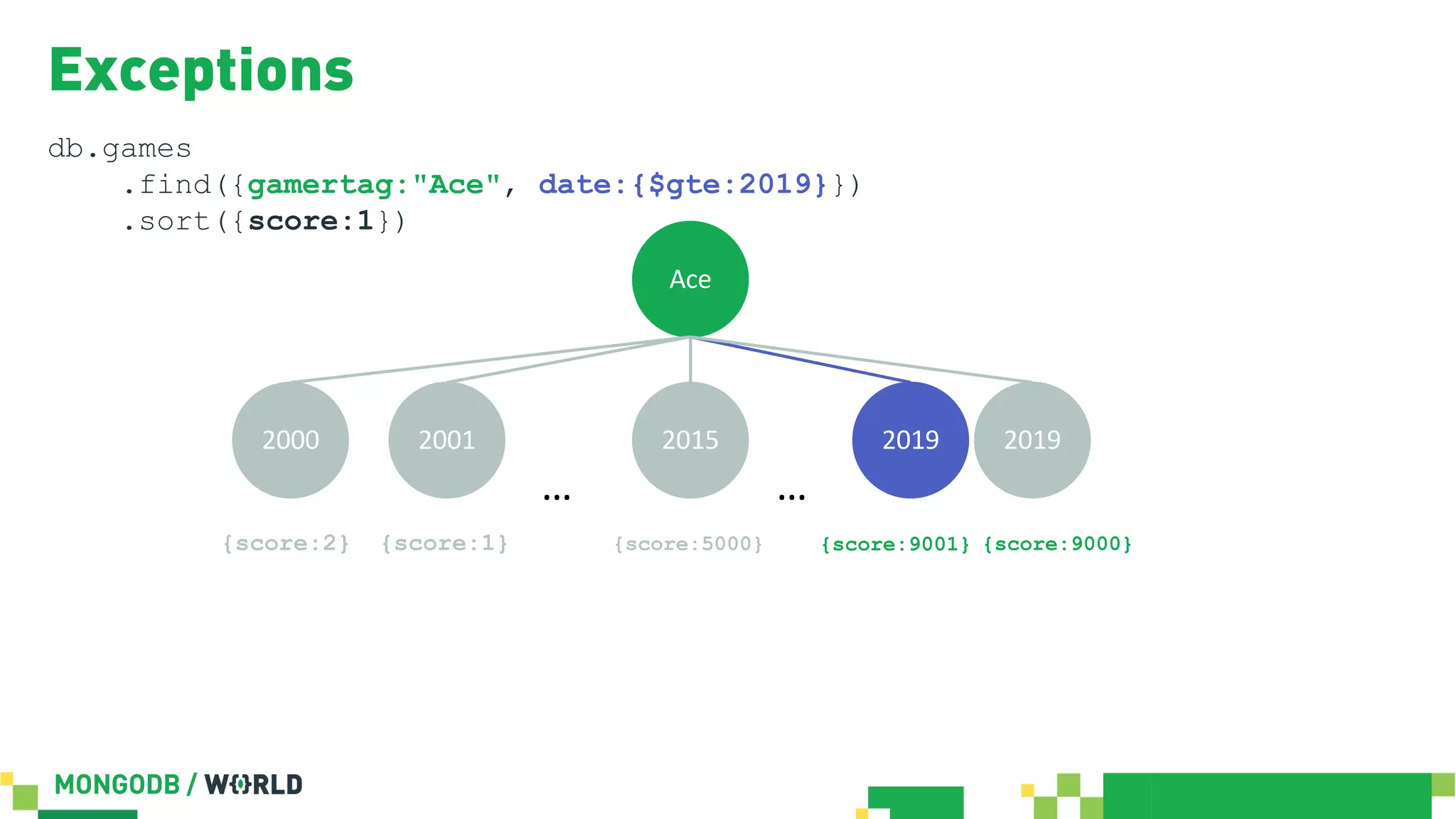








![Single Field Index
Ace Doyen
{ gamertag: "Ace",
games:["Mario", "Halo"] }
{ gamertag: "Doyen",
games:["Fortnite", "GTA", "Minecraft"] }{} {}](https://image.slidesharecdn.com/chrisharristips-190701182900/75/MongoDB-World-2019-Tips-and-Tricks-for-Querying-and-Indexing-MongoDB-147-2048.jpg)




![Semantics
{ _id: 1, players: [ { name: "Doyen", rank : 1 },
{ name: "Ace", rank : 2 } ] }
{ _id: 2, players: [ { name: "Ace", rank : 1 },
{ name: "Doyen", rank : 2 } ] }
{ _id: 3, players: [ { name: "Doyen", rank : 1 },
{ name: "Cali", rank : 2 } ] }](https://image.slidesharecdn.com/chrisharristips-190701182900/75/MongoDB-World-2019-Tips-and-Tricks-for-Querying-and-Indexing-MongoDB-152-2048.jpg)
![Semantics
{ _id: 1, players: [ { name: "Doyen", rank : 1 },
{ name: "Ace", rank : 2 } ] }
{ _id: 2, players: [ { name: "Ace", rank : 1 },
{ name: "Doyen", rank : 2 } ] }
{ _id: 3, players: [ { name: "Doyen", rank : 1 },
{ name: "Cali", rank : 2 } ] }](https://image.slidesharecdn.com/chrisharristips-190701182900/75/MongoDB-World-2019-Tips-and-Tricks-for-Querying-and-Indexing-MongoDB-153-2048.jpg)
![Semantics
{ _id: 1, players: [ { name: "Doyen", rank : 1 },
{ name: "Ace", rank : 2 } ] }
{ _id: 2, players: [ { name: "Ace", rank : 1 },
{ name: "Doyen", rank : 2 } ] }
{ _id: 3, players: [ { name: "Doyen", rank : 1 },
{ name: "Cali", rank : 2 } ] }](https://image.slidesharecdn.com/chrisharristips-190701182900/75/MongoDB-World-2019-Tips-and-Tricks-for-Querying-and-Indexing-MongoDB-154-2048.jpg)
![Semantics
{ _id: 1, players: [ { name: "Doyen", rank : 1 },
{ name: "Ace", rank : 2 } ] }
{ _id: 2, players: [ { name: "Ace", rank : 1 },
{ name: "Doyen", rank : 2 } ] }
{ _id: 3, players: [ { name: "Doyen", rank : 1 },
{ name: "Cali", rank : 2 } ] }
db.matches.find({ "players.name": "Ace",
"players.rank": 1 })](https://image.slidesharecdn.com/chrisharristips-190701182900/75/MongoDB-World-2019-Tips-and-Tricks-for-Querying-and-Indexing-MongoDB-155-2048.jpg)
![Semantics
{ _id: 1, players: [ { name: "Doyen", rank : 1 },
{ name: "Ace", rank : 2 } ] }
{ _id: 2, players: [ { name: "Ace", rank : 1 },
{ name: "Doyen", rank : 2 } ] }
{ _id: 3, players: [ { name: "Doyen", rank : 1 },
{ name: "Cali", rank : 2 } ] }
db.matches.find({ "players.name": "Ace",
"players.rank": 1 })](https://image.slidesharecdn.com/chrisharristips-190701182900/75/MongoDB-World-2019-Tips-and-Tricks-for-Querying-and-Indexing-MongoDB-156-2048.jpg)
![Semantics
{ _id: 1, players: [ { name: "Doyen", rank : 1 },
{ name: "Ace", rank : 2 } ] }
{ _id: 2, players: [ { name: "Ace", rank : 1 },
{ name: "Doyen", rank : 2 } ] }
{ _id: 3, players: [ { name: "Doyen", rank : 1 },
{ name: "Cali", rank : 2 } ] }
db.matches.find({ "players.name": "Ace",
"players.rank": 1 })](https://image.slidesharecdn.com/chrisharristips-190701182900/75/MongoDB-World-2019-Tips-and-Tricks-for-Querying-and-Indexing-MongoDB-157-2048.jpg)
![Semantics
{ _id: 1, players: [ { name: "Doyen", rank : 1 },
{ name: "Ace", rank : 2 } ] }
{ _id: 2, players: [ { name: "Ace", rank : 1 },
{ name: "Doyen", rank : 2 } ] }
{ _id: 3, players: [ { name: "Doyen", rank : 1 },
{ name: "Cali", rank : 2 } ] }
"You can specify the query such that either a single array element meets these conditions](https://image.slidesharecdn.com/chrisharristips-190701182900/75/MongoDB-World-2019-Tips-and-Tricks-for-Querying-and-Indexing-MongoDB-158-2048.jpg)
![Semantics
{ _id: 1, players: [ { name: "Doyen", rank : 1 },
{ name: "Ace", rank : 2 } ] }
{ _id: 2, players: [ { name: "Ace", rank : 1 },
{ name: "Doyen", rank : 2 } ] }
{ _id: 3, players: [ { name: "Doyen", rank : 1 },
{ name: "Cali", rank : 2 } ] }
"You can specify the query such that either a single array element meets these conditions or
any combination of array elements meets the conditions."](https://image.slidesharecdn.com/chrisharristips-190701182900/75/MongoDB-World-2019-Tips-and-Tricks-for-Querying-and-Indexing-MongoDB-159-2048.jpg)
![Semantics
{ _id: 1, players: [ { name: "Doyen", rank : 1 },
{ name: "Ace", rank : 2 } ] }
{ _id: 2, players: [ { name: "Ace", rank : 1 },
{ name: "Doyen", rank : 2 } ] }
{ _id: 3, players: [ { name: "Doyen", rank : 1 },
{ name: "Cali", rank : 2 } ] }
"You can specify the query such that either a single array element meets these conditions or
any combination of array elements meets the conditions."
db.matches.find({ "players.name": "Ace", "players.rank": 1 })](https://image.slidesharecdn.com/chrisharristips-190701182900/75/MongoDB-World-2019-Tips-and-Tricks-for-Querying-and-Indexing-MongoDB-160-2048.jpg)
![Semantics
{ _id: 1, players: [ { name: "Doyen", rank : 1 },
{ name: "Ace", rank : 2 } ] }
{ _id: 2, players: [ { name: "Ace", rank : 1 },
{ name: "Doyen", rank : 2 } ] }
{ _id: 3, players: [ { name: "Doyen", rank : 1 },
{ name: "Cali", rank : 2 } ] }
"You can specify the query such that either a single array element meets these conditions or
any combination of array elements meets the conditions."
db.matches.find({ "players.name": "Ace", "players.rank": 1 })](https://image.slidesharecdn.com/chrisharristips-190701182900/75/MongoDB-World-2019-Tips-and-Tricks-for-Querying-and-Indexing-MongoDB-161-2048.jpg)
![Semantics
{ _id: 1, players: [ { name: "Doyen", rank : 1 },
{ name: "Ace", rank : 2 } ] }
{ _id: 2, players: [ { name: "Ace", rank : 1 },
{ name: "Doyen", rank : 2 } ] }
{ _id: 3, players: [ { name: "Doyen", rank : 1 },
{ name: "Cali", rank : 2 } ] }
"You can specify the query such that either a single array element meets these conditions or
any combination of array elements meets the conditions."
db.matches.find({ "players.name": "Ace", "players.rank": 1 })](https://image.slidesharecdn.com/chrisharristips-190701182900/75/MongoDB-World-2019-Tips-and-Tricks-for-Querying-and-Indexing-MongoDB-162-2048.jpg)
![Semantics
{ _id: 1, players: [ { name: "Doyen", rank : 1 },
{ name: "Ace", rank : 2 } ] }
{ _id: 2, players: [ { name: "Ace", rank : 1 },
{ name: "Doyen", rank : 2 } ] }
{ _id: 3, players: [ { name: "Doyen", rank : 1 },
{ name: "Cali", rank : 2 } ] }
"You can specify the query such that either a single array element meets these conditions or
any combination of array elements meets the conditions."
db.matches.find({ "players.name": "Ace", "players.rank": 1 })](https://image.slidesharecdn.com/chrisharristips-190701182900/75/MongoDB-World-2019-Tips-and-Tricks-for-Querying-and-Indexing-MongoDB-163-2048.jpg)
![Semantics
{ _id: 1, players: [ { name: "Doyen", rank : 1 },
{ name: "Ace", rank : 2 } ] }
{ _id: 2, players: [ { name: "Ace", rank : 1 },
{ name: "Doyen", rank : 2 } ] }
{ _id: 3, players: [ { name: "Doyen", rank : 1 },
{ name: "Cali", rank : 2 } ] }
"You can specify the query such that either a single array element meets these conditions or
any combination of array elements meets the conditions."
db.matches.find({ "players.name": "Ace", "players.rank": 1 })](https://image.slidesharecdn.com/chrisharristips-190701182900/75/MongoDB-World-2019-Tips-and-Tricks-for-Querying-and-Indexing-MongoDB-164-2048.jpg)
![Semantics
{ _id: 1, players: [ { name: "Doyen", rank : 1 },
{ name: "Ace", rank : 2 } ] }
{ _id: 2, players: [ { name: "Ace", rank : 1 },
{ name: "Doyen", rank : 2 } ] }
{ _id: 3, players: [ { name: "Doyen", rank : 1 },
{ name: "Cali", rank : 2 } ] }
"You can specify the query such that either a single array element meets these conditions or
any combination of array elements meets the conditions."
db.matches.find({ "players.name": "Ace", "players.rank": 1 })](https://image.slidesharecdn.com/chrisharristips-190701182900/75/MongoDB-World-2019-Tips-and-Tricks-for-Querying-and-Indexing-MongoDB-165-2048.jpg)
![Semantics
{ _id: 1, players: [ { name: "Doyen", rank : 1 },
{ name: "Ace", rank : 2 } ] }
{ _id: 2, players: [ { name: "Ace", rank : 1 },
{ name: "Doyen", rank : 2 } ] }
{ _id: 3, players: [ { name: "Doyen", rank : 1 },
{ name: "Cali", rank : 2 } ] }
"You can specify the query such that either a single array element meets these conditions or
any combination of array elements meets the conditions."
db.matches.find({ "players.name": "Ace", "players.rank": 1 })](https://image.slidesharecdn.com/chrisharristips-190701182900/75/MongoDB-World-2019-Tips-and-Tricks-for-Querying-and-Indexing-MongoDB-166-2048.jpg)
![Semantics
{ _id: 1, players: [ { name: "Doyen", rank : 1 },
{ name: "Ace", rank : 2 } ] }
{ _id: 2, players: [ { name: "Ace", rank : 1 },
{ name: "Doyen", rank : 2 } ] }
{ _id: 3, players: [ { name: "Doyen", rank : 1 },
{ name: "Cali", rank : 2 } ] }
"You can specify the query such that either a single array element meets these conditions or
any combination of array elements meets the conditions."
db.matches.find({ "players.name": "Ace", "players.rank": 1 })](https://image.slidesharecdn.com/chrisharristips-190701182900/75/MongoDB-World-2019-Tips-and-Tricks-for-Querying-and-Indexing-MongoDB-167-2048.jpg)
![Semantics
{ _id: 1, players: [ { name: "Doyen", rank : 1 },
{ name: "Ace", rank : 2 } ] }
{ _id: 2, players: [ { name: "Ace", rank : 1 },
{ name: "Doyen", rank : 2 } ] }
{ _id: 3, players: [ { name: "Doyen", rank : 1 },
{ name: "Cali", rank : 2 } ] }
"You can specify the query such that either a single array element meets these conditions or
any combination of array elements meets the conditions."
db.matches.find({ "players.name": "Ace", "players.rank": 1 })](https://image.slidesharecdn.com/chrisharristips-190701182900/75/MongoDB-World-2019-Tips-and-Tricks-for-Querying-and-Indexing-MongoDB-168-2048.jpg)
![Semantics
{ _id: 1, players: [ { name: "Doyen", rank : 1 },
{ name: "Ace", rank : 2 } ] }
{ _id: 2, players: [ { name: "Ace", rank : 1 },
{ name: "Doyen", rank : 2 } ] }
{ _id: 3, players: [ { name: "Doyen", rank : 1 },
{ name: "Cali", rank : 2 } ] }
"You can specify the query such that either a single array element meets these conditions or
any combination of array elements meets the conditions."
db.matches.find({ "players.name": "Ace", "players.rank": 1 })](https://image.slidesharecdn.com/chrisharristips-190701182900/75/MongoDB-World-2019-Tips-and-Tricks-for-Querying-and-Indexing-MongoDB-169-2048.jpg)
![Semantics
{ _id: 1, players: [ { name: "Doyen", rank : 1 },
{ name: "Ace", rank : 2 } ] }
{ _id: 2, players: [ { name: "Ace", rank : 1 },
{ name: "Doyen", rank : 2 } ] }
{ _id: 3, players: [ { name: "Doyen", rank : 1 },
{ name: "Cali", rank : 2 } ] }
"You can specify the query such that either a single array element meets these conditions or
any combination of array elements meets the conditions."
db.matches.find({ "players.name": "Ace", "players.rank": 1 })](https://image.slidesharecdn.com/chrisharristips-190701182900/75/MongoDB-World-2019-Tips-and-Tricks-for-Querying-and-Indexing-MongoDB-170-2048.jpg)
![Semantics - $elemMatch
{ _id: 1, players: [ { name: "Doyen", rank : 1 },
{ name: "Ace", rank : 2 } ] }
{ _id: 2, players: [ { name: "Ace", rank : 1 },
{ name: "Doyen", rank : 2 } ] }
db.matches.find({ "players.name": "Ace", "players.rank": 1 })](https://image.slidesharecdn.com/chrisharristips-190701182900/75/MongoDB-World-2019-Tips-and-Tricks-for-Querying-and-Indexing-MongoDB-171-2048.jpg)
![Semantics - $elemMatch
{ _id: 1, players: [ { name: "Doyen", rank : 1 },
{ name: "Ace", rank : 2 } ] }
{ _id: 2, players: [ { name: "Ace", rank : 1 },
{ name: "Doyen", rank : 2 } ] }
db.matches.find({ "players.name": "Ace", "players.rank": 1 })
db.matches.find({ "players":
{ $elemMatch: { name: "Ace", "rank": 1} }
})](https://image.slidesharecdn.com/chrisharristips-190701182900/75/MongoDB-World-2019-Tips-and-Tricks-for-Querying-and-Indexing-MongoDB-172-2048.jpg)


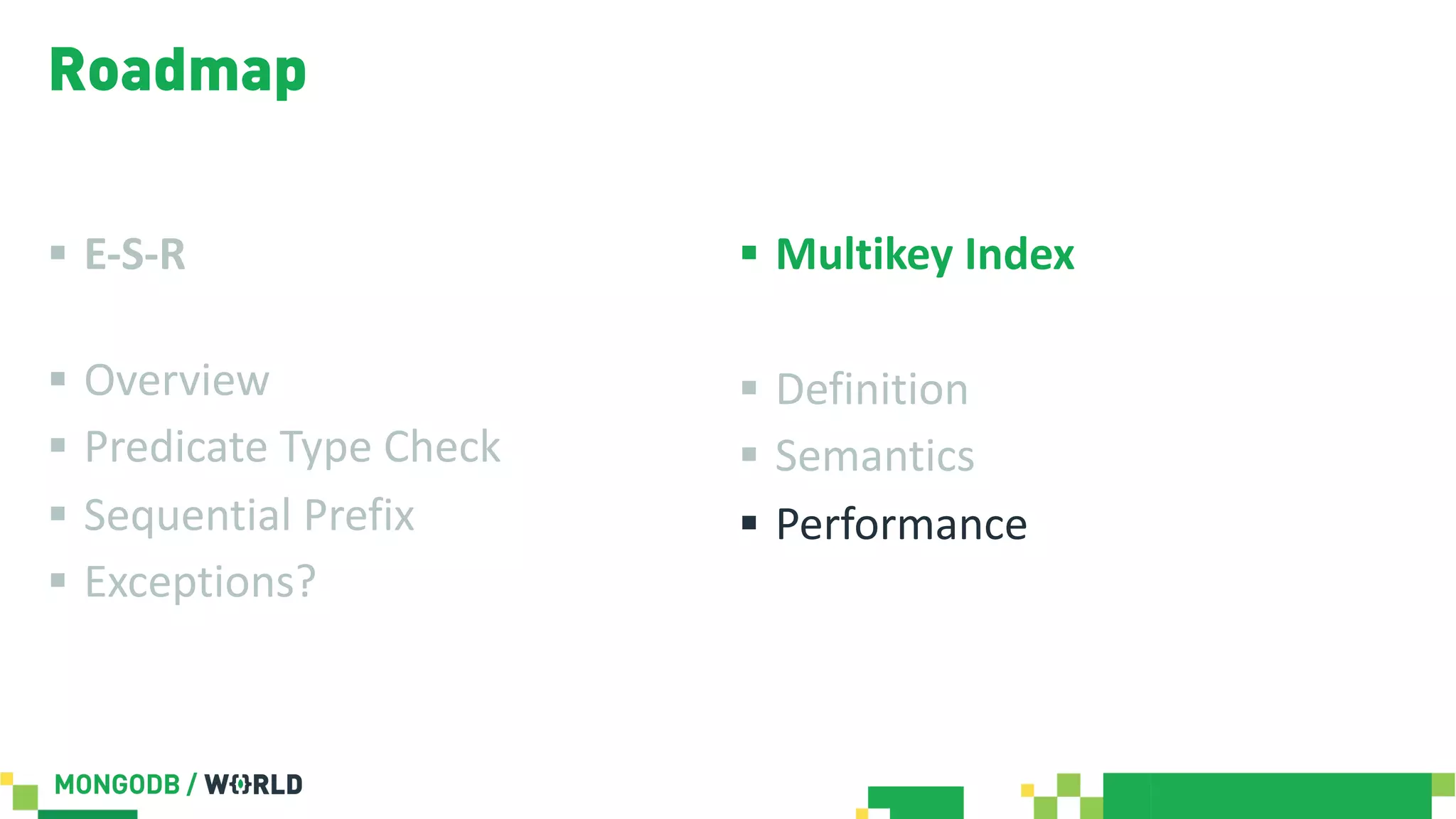
![Multikey Path Tracking
{
"_id" : 1,
"game" : "Halo",
"players" : [
"Ace",
"Doyen",
"Cali",
"Bob"
],
"date" : ISODate("2019-02-15T00:00:00Z")
}](https://image.slidesharecdn.com/chrisharristips-190701182900/75/MongoDB-World-2019-Tips-and-Tricks-for-Querying-and-Indexing-MongoDB-176-2048.jpg)
![Multikey Path Tracking
{
"_id" : 1,
"game" : "Halo",
"players" : [
"Ace",
"Doyen",
"Cali",
"Bob"
],
"date" : ISODate("2019-02-15T00:00:00Z")
}
db.matches.find({
players:"Ace",
date:{
$gte:ISODate("2019-02-01"), $lte:ISODate("2019-02-28")
}
})](https://image.slidesharecdn.com/chrisharristips-190701182900/75/MongoDB-World-2019-Tips-and-Tricks-for-Querying-and-Indexing-MongoDB-177-2048.jpg)
![Multikey Path Tracking
{
"_id" : 1,
"game" : "Halo",
"players" : [
"Ace",
"Doyen",
"Cali",
"Bob"
],
"date" : ISODate("2019-02-15T00:00:00Z")
}
db.matches.find({
players:"Ace",
date:{
$gte:ISODate("2019-02-01"), $lte:ISODate("2019-02-28")
}
})
.explain()
…
"indexBounds" : {
"players" : [
"["Ace", "Ace"]"
],
"date" : [
"(true, new Date(1551312000000)]"
]
}](https://image.slidesharecdn.com/chrisharristips-190701182900/75/MongoDB-World-2019-Tips-and-Tricks-for-Querying-and-Indexing-MongoDB-178-2048.jpg)
![Multikey Path Tracking
{
"_id" : 1,
"game" : "Halo",
"players" : [
"Ace",
"Doyen",
"Cali",
"Bob"
],
"date" : ISODate("2019-02-15T00:00:00Z")
}
db.matches.find({
players:"Ace",
date:{
$gte:ISODate("2019-02-01"), $lte:ISODate("2019-02-28")
}
})
.explain()
…
"indexBounds" : {
"players" : [
"["Ace", "Ace"]"
],
"date" : [
"(true, new Date(1551312000000)]"
]
}](https://image.slidesharecdn.com/chrisharristips-190701182900/75/MongoDB-World-2019-Tips-and-Tricks-for-Querying-and-Indexing-MongoDB-179-2048.jpg)
![Multikey Path Tracking
{
"_id" : 1,
"game" : "Halo",
"players" : [
"Ace",
"Doyen",
"Cali",
"Bob"
],
"date" : ISODate("2019-02-15T00:00:00Z")
}
db.matches.find({
players:"Ace",
date:{
$gte:ISODate("2019-02-01"), $lte:ISODate("2019-02-28")
}
})
.explain()
…
"indexBounds" : {
"players" : [
"["Ace", "Ace"]"
],
"date" : [
"(true, new Date(1551312000000)]"
]
}](https://image.slidesharecdn.com/chrisharristips-190701182900/75/MongoDB-World-2019-Tips-and-Tricks-for-Querying-and-Indexing-MongoDB-180-2048.jpg)
![Multikey Path Tracking
{
"_id" : 1,
"game" : "Halo",
"players" : [
"Ace",
"Doyen",
"Cali",
"Bob"
],
"date" : ISODate("2019-02-15T00:00:00Z")
}
db.matches.find({
players:"Ace",
date:{
$gte:ISODate("2019-02-01"), $lte:ISODate("2019-02-28")
}
})
.explain()
…
"indexBounds" : {
"players" : [
"["Ace", "Ace"]"
],
"date" : [
"(true, new Date(1551312000000)]"
]
}](https://image.slidesharecdn.com/chrisharristips-190701182900/75/MongoDB-World-2019-Tips-and-Tricks-for-Querying-and-Indexing-MongoDB-181-2048.jpg)

![Multikey Path Tracking
Before MongoDB 3.4:
"stage" : "IXSCAN",
"indexName" : "players_1_date_1",
"isMultiKey" : true,
"indexBounds" : {
"players" : [
"["Ace", "Ace"]"
],
"date" : [
"(true, new Date(1551312000000)]"
]
}
3.4+:
...
"multiKeyPaths" : {
"players" : [ "players" ],
"date" : [ ]
},
"indexBounds" : {
"players" : [
"["Ace", "Ace"]"
],
"date" : [
"[new Date(1548979200000),
new Date(1551312000000)]"
]
}](https://image.slidesharecdn.com/chrisharristips-190701182900/75/MongoDB-World-2019-Tips-and-Tricks-for-Querying-and-Indexing-MongoDB-183-2048.jpg)








